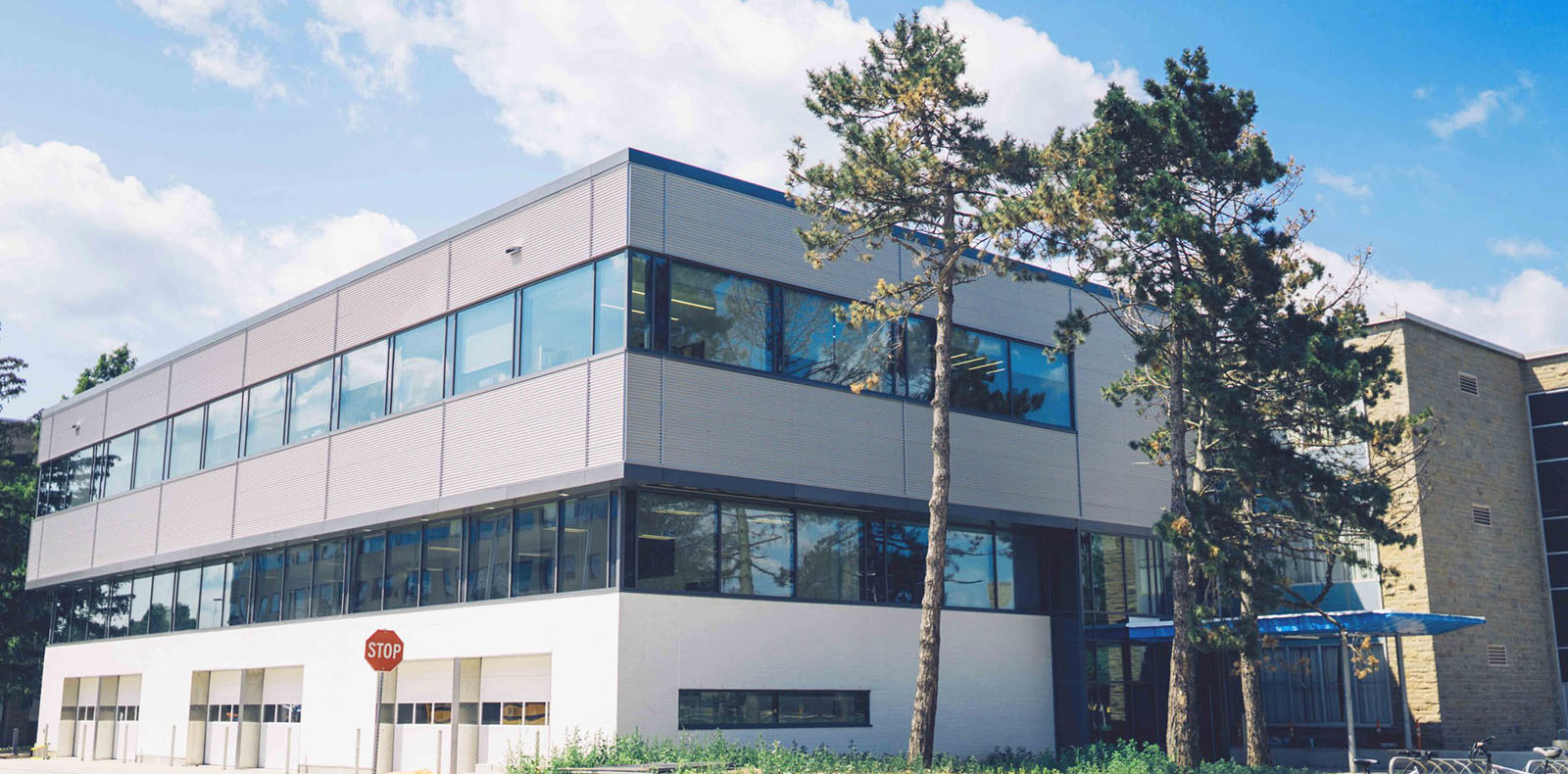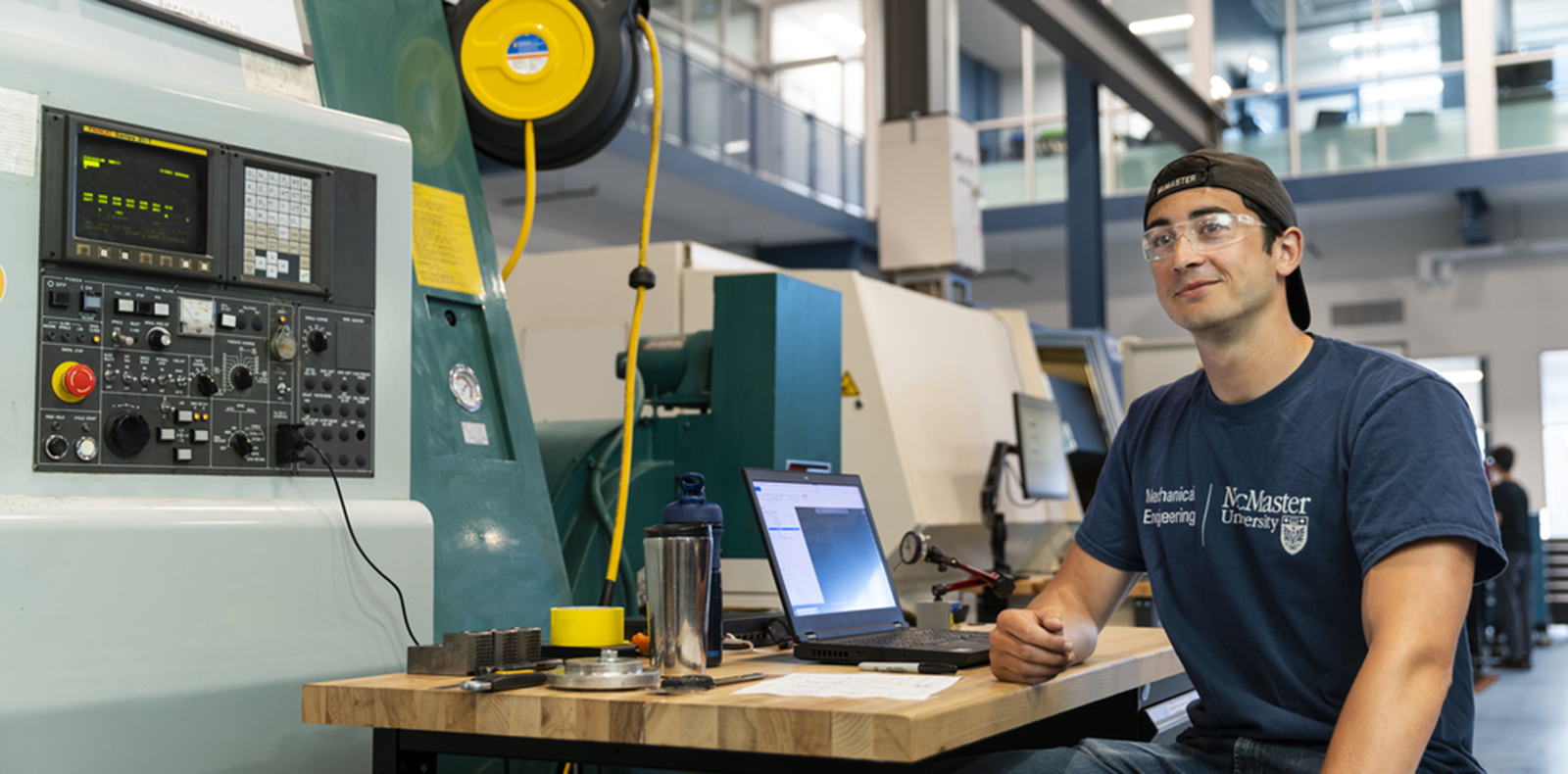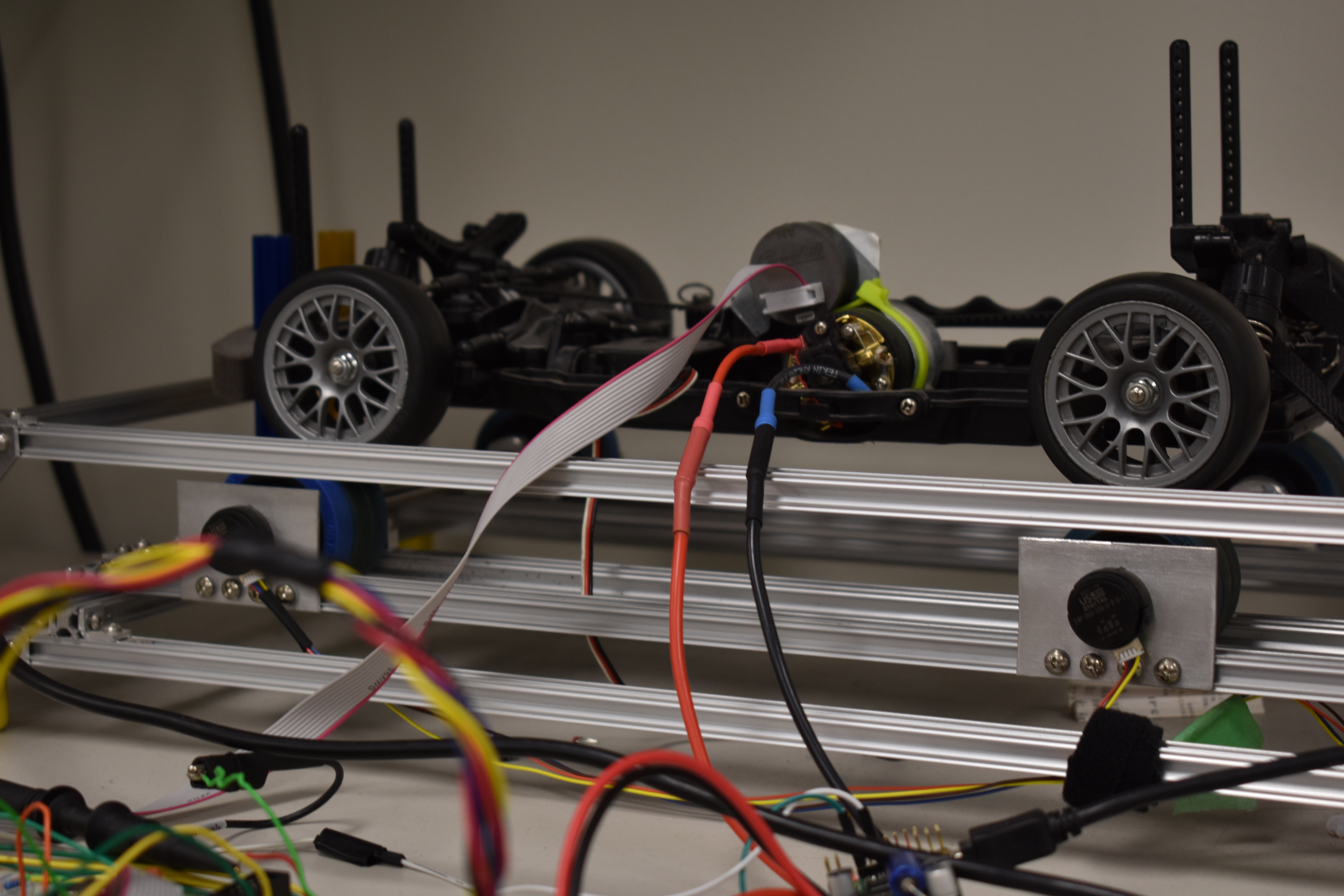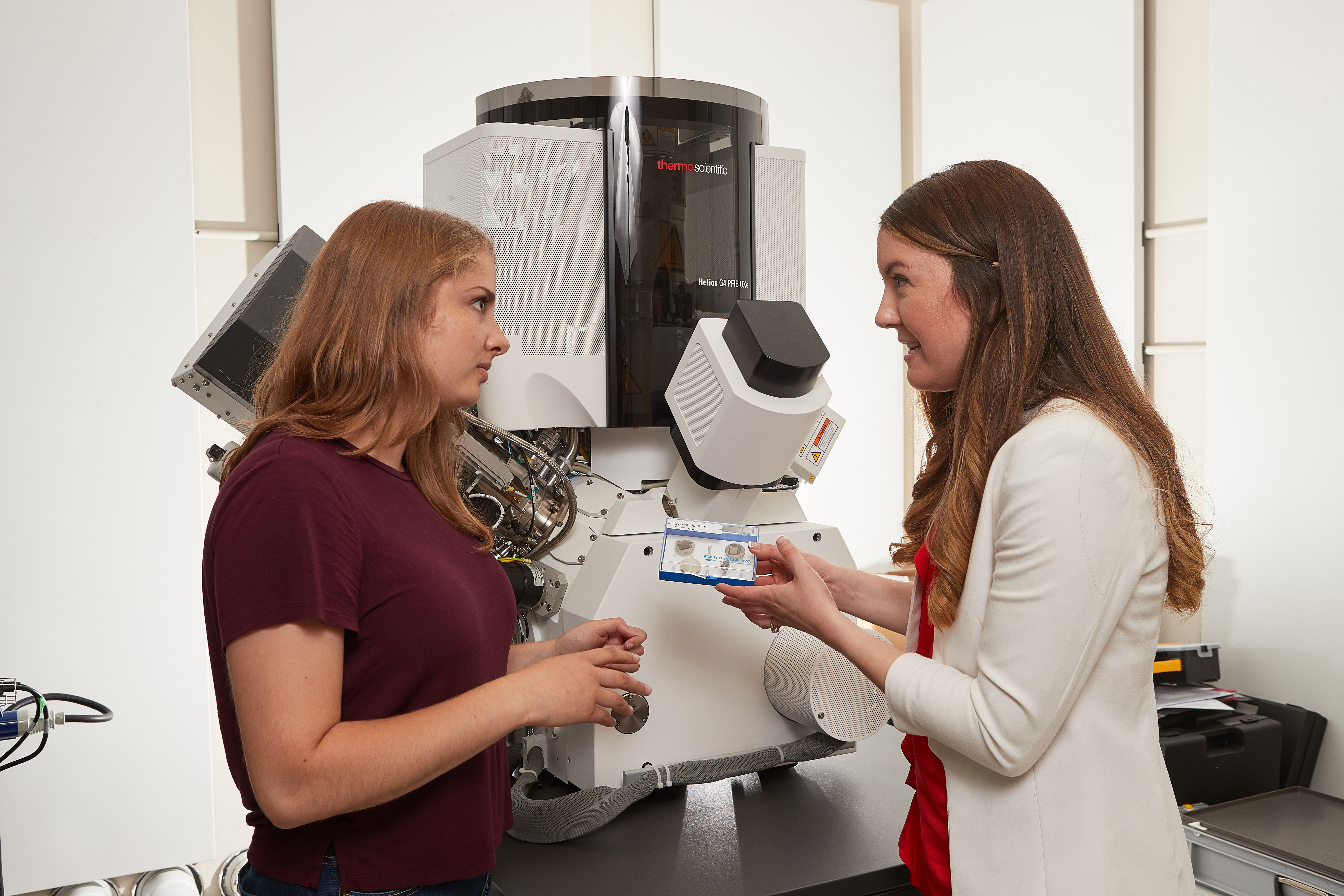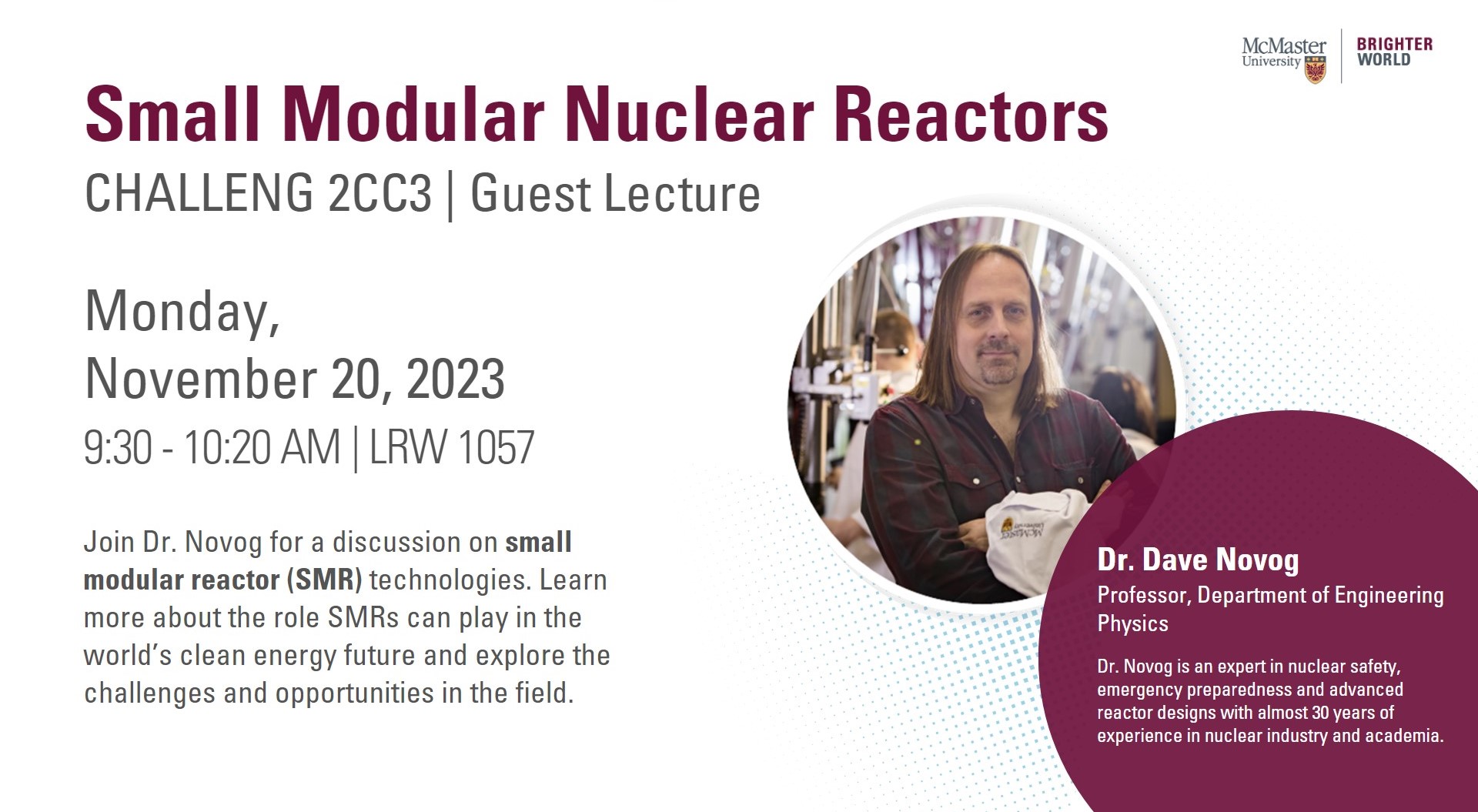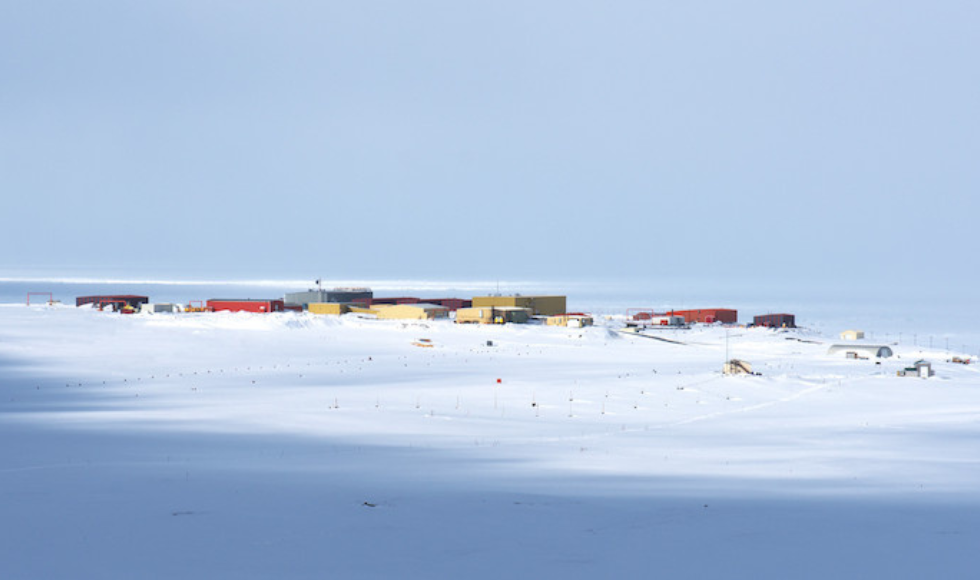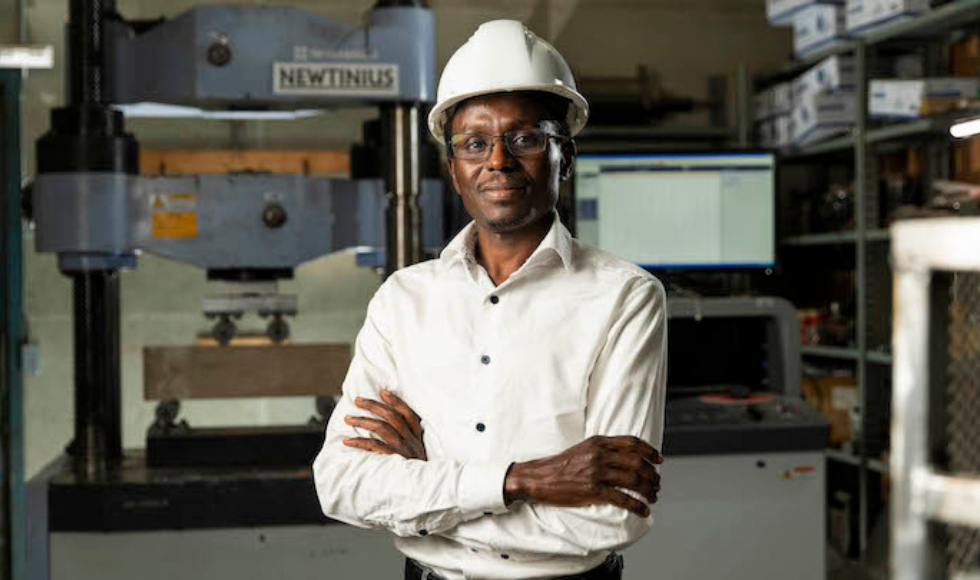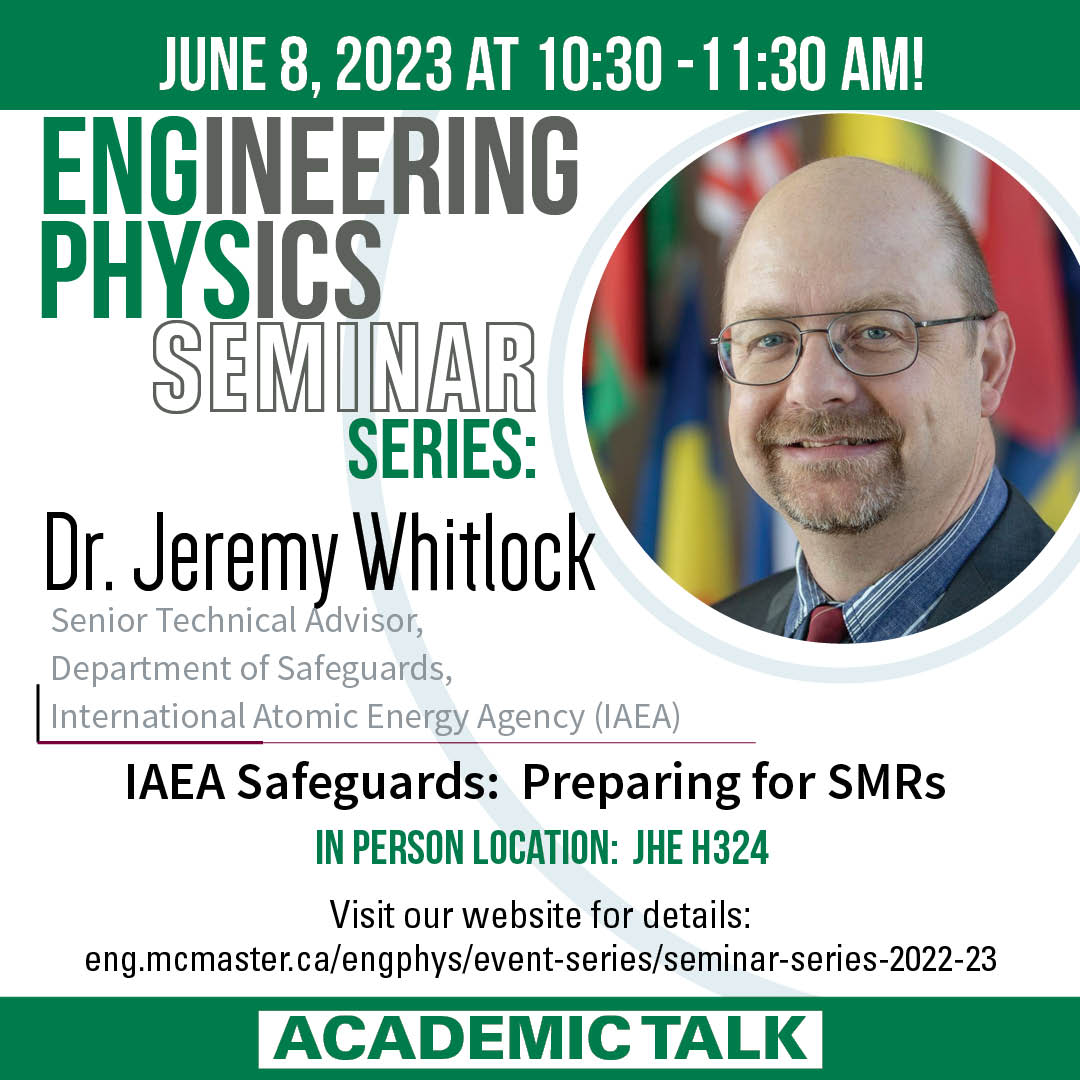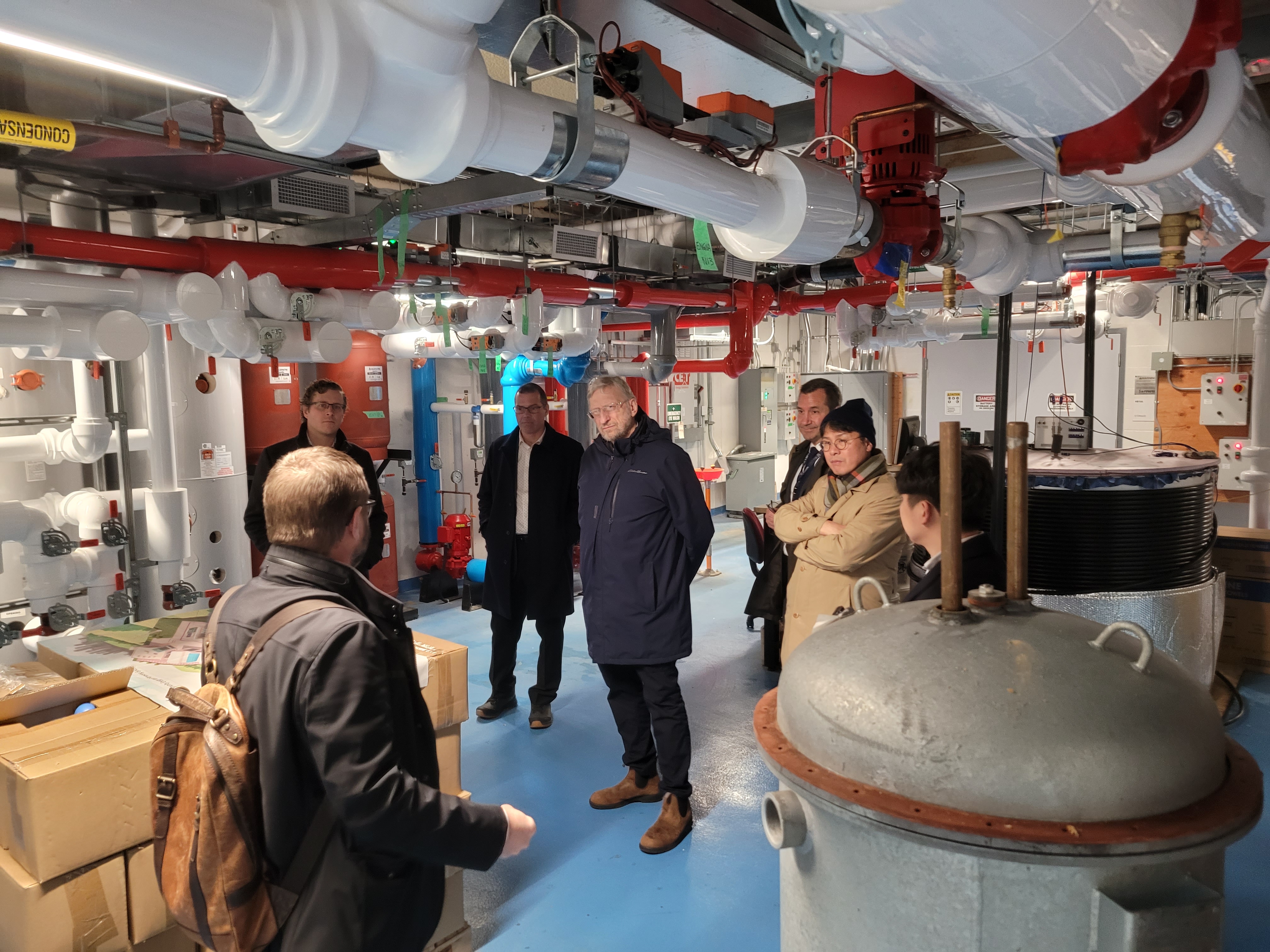Meet the Researchers
Information Box Group
Dr. Marilyn Lightstone
Chair and Professor
Department of Mechanical Engineering
Dr. Marilyn Lightstone is a professor and chair in the department of mechanical engineering. She is a fellow of the Canadian Society for Mechanical Engineering. Before coming to McMaster, Dr. Lightstone was a nuclear thermalhydraulics analyst at Atomic Energy of Canada Limited. Dr. Lightstone’s research interests include computational fluid dynamics, heat transfer, and turbulent flows. Her nuclear research involves the modelling of inter-subchannel mixing for CANDU fuel bundles and the modelling of natural convection corium flows resulting from severe accidents. Her nuclear research is funded by the Natural Sciences and Engineering Research Council of Canada (NSERC) and the University Network of Excellence in Nuclear Engineering (UNENE).

Dr. Marilyn Lightstone
Chair and Professor
Department of Mechanical Engineering
Dr. James S. Cotton
Co-Director, McMaster Institute for Energy Studies
Professor
Department of Mechanical Engineering
Dr. James Cotton is a professor in the department of mechanical engineering and co-director of the McMaster Institute for Energy Studies (MIES). Dr. Cotton’s research focuses on developing, modeling and experimentally validating energy systems and technologies to advance safe and efficient thermal management solutions, integrated energy systems, and nuclear energy harvesting technologies. Dr. Cotton’s research and industry experience involves nearly all aspects of the energy network, ranging from improving hybrid and electric vehicle performance, integrated community energy systems, and waste heat recovery from commercial and industrial processes to experimental and system modeling research on CANDU and micro-modular reactor (MMR) sub-systems and components.
Over the past six years, Dr. Cotton has liaised with a wide variety of communities and industrial partners to establish community energy plans, identify problems facing industry, and develop technology road maps to address these challenges and lead comprehensive research programs to provide sustainable energy solutions.

Dr. James S. Cotton
Co-Director, McMaster Institute for Energy Studies
Professor
Department of Mechanical Engineering
Dr. Stephen C. Veldhuis
Director, McMaster Manufacturing Research Institute
Professor
Department of Mechanical Engineering
Dr. Stephen Veldhuis is a professor in the department of mechanical engineering and director of the McMaster Manufacturing Research Institute (MMRI). Through his involvement in the MMRI, Dr. Veldhuis has worked with many researchers and industrial partners on leading-edge manufacturing technologies targeting a wide range of materials, complex geometries, and challenging finishes of direct importance to manufacturing SMRs. He is the Braley-Orlick Chair in Advanced Manufacturing Engineering.
His areas of interest in high-performance manufacturing include: continuous improvement through Lean initiatives, targeting tooling improvements and process development/optimization, and Industry 4.0 technologies, including process modeling, sensor integration, industrial Internet of Things (iIOT) and Artificial Intelligence (AI) / Machine Learning (ML), all of which are applied to realize higher levels of digitization on the shop floor to drive better decision-making.

Dr. Stephen C. Veldhuis
Director, McMaster Manufacturing Research Institute
Professor
Department of Mechanical Engineering
Dr. John Luxat
UNENE Industrial Research Chair
Professor
Department of Engineering Physics
Dr. John Luxat is a professor in the Department of Engineering Physics and holds a UNENE research chair in nuclear safety analysis. Dr. Luxat conducts experimental and theoretical modelling studies in nuclear safety thermalhydraulics. He performs severe accident modelling and analysis of nuclear power plants, including CANDU reactors. Dr. Luxat’s research in nuclear safety analysis methodology seeks to define, using an integrated probabilistic approach, the range of key plant parameters that assure safety limits are met at a prescribed level of probability and confidence. In particular, Dr. Luxat studies how changes in heat transfer regimes from nucleate boiling to film boiling influence both the operational safety margins and integrity of components of nuclear reactors during accidents.

Dr. John Luxat
UNENE Industrial Research Chair
Professor
Department of Engineering Physics
Dr. Dave Novog
Co-Director, McMaster Institute for Energy Studies
Professor
Department of Engineering Physics
Dr. Dave Novog is a professor in the department of engineering physics. He holds a UNENE industrial research chair in nuclear safety and several NSERC awards for nuclear research. His research focuses on nuclear safety, emergency planning and advanced inspection technologies. Dr. Novog is an appointed member of the OECD’s Generation IV Risk and Safety Working Group. He is also the co-director of the McMaster Institute for Energy Studies (MIES), which is involved in a broad range of energy initiatives, including research on coupling SMRs with community infrastructure to maximize the benefits of SMRs for host regions. He is currently leading the multi-university Small Modular Advanced Reactor Training (SMART) program which aims to provide graduates with skills in management, technology development, and government policy, in addition to the technical fundamentals of various SMR designs.

Dr. Dave Novog
Co-Director, McMaster Institute for Energy Studies
Professor
Department of Engineering Physics
Dr. Shinya Nagasaki
Professor
Department of Engineering Physics
Dr. Shinya Nagasaki is a professor in the department of engineering physics. Dr. Nagasaki has studied the safety, waste disposal, and fuel cycles of a variety of nuclear reactors, like CANDU, LWR, and SCWR. Dr. Nagasaki is currently studying the optimized deployment of SMRs in Ontario on-grid systems and off-grid systems. Dr. Nagasaki is particularly interested in the radioactive waste management of SMRs. Through experimentation and theoretical simulation, Dr. Nagasaki is studying the sorption and diffusion of key elements, such as U, Pu, Tc, and Np. Dr. Nagasaki’s work is needed for identifying, analyzing, and managing the risks and uncertainties that must be considered in SMR deployment, from inventories and compositions of radionuclides to economic, political, societal, and environmental impacts.
Dr. Nagasaki will also be leading a training course on SMR waste management and fuel cycles as part of the SMART program.
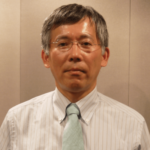
Dr. Shinya Nagasaki
Professor
Department of Engineering Physics
Dr. Adriaan Buijs
Professor and Associate Chair of Graduate Studies
Department of Engineering Physics
Dr. Adriaan Buijs is a professor and associate chair of graduate studies in the department of engineering physics. Dr. Buijs has over 20 years of experience in the nuclear industry (AECL and McMaster), including leading the physics design of the Advanced CANDU Reactor (ACR-1000). Dr. Buijs’ research is focused in reactor core physics and reactor design. Dr. Buijs is currently participating in the design of SMRs that use graphite as a moderator and different types of fuel and coolant. In particular, Dr. Buijs studies the neutronic behaviours of reactor cores and the possibility for creating a sub-critical test facility for SMRs at McMaster. Dr. Buijs also participates actively in McMaster’s SMART program.
Dr. Buijs is leading a research project funded by NSERC and the Canadian Nuclear Safety Commission focused on the Development of Tools for Analysis of Power Excursion Events of TRISO-Fuelled SMRs.

Dr. Adriaan Buijs
Professor and Associate Chair of Graduate Studies
Department of Engineering Physics
Dr. Christian Reiter
Adjunct Professor
Department of Engineering Physics
Dr. Christian Reiter is an adjunct professor in the department of engineering physics. He received a diploma in Physics from the Technical University of Munich (TUM) in 2014 and obtained his PhD in Physics from TUM in 2019. Dr. Reiter is currently the Head of Nuclear Science, Theory Division at TUM’s FRM II nuclear reactor. As part of McMaster and TUM’s Strategic Partnership, Dr. Reiter is collaborating with McMaster faculty to advance research and education in reactor core modelling and thermal hydraulics.
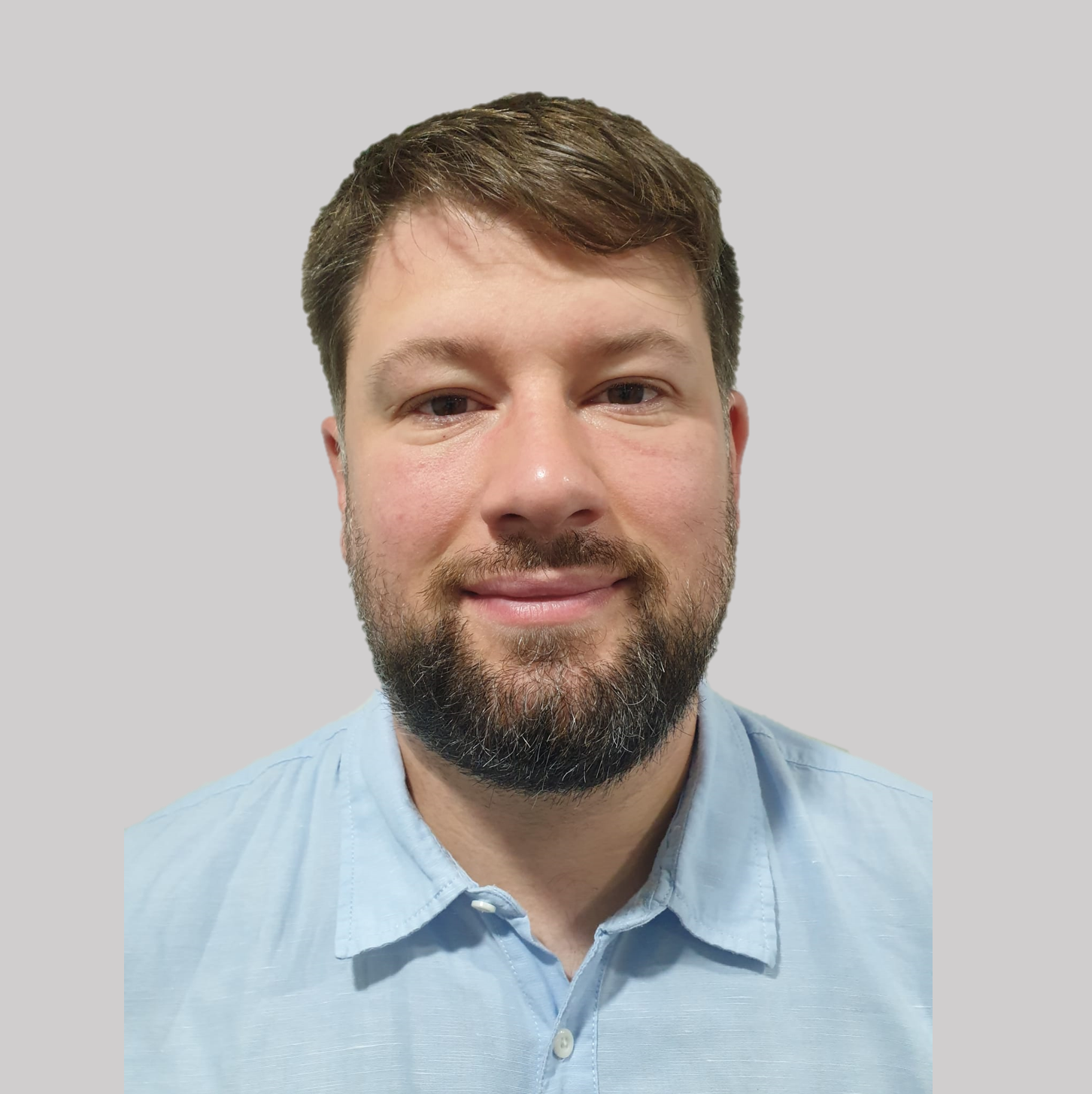
Dr. Christian Reiter
Adjunct Professor
Department of Engineering Physics
Dr. Markus Piro
Associate Professor
Department of Engineering Physics
Dr. Markus Piro is an associate professor in the Department of Engineering Physics. His research is focused on supporting the existing fleet of CANDU nuclear generating stations, performing fundamental research in support of emerging nuclear technologies (particularly SMRs), and research reactors. Dr. Piro held the Canada Research Chair in Nuclear Fuels and Materials at Ontario Tech University, where he led a multi-disciplinary team of students and post-docs working on academic and industrial projects in Canada and abroad.
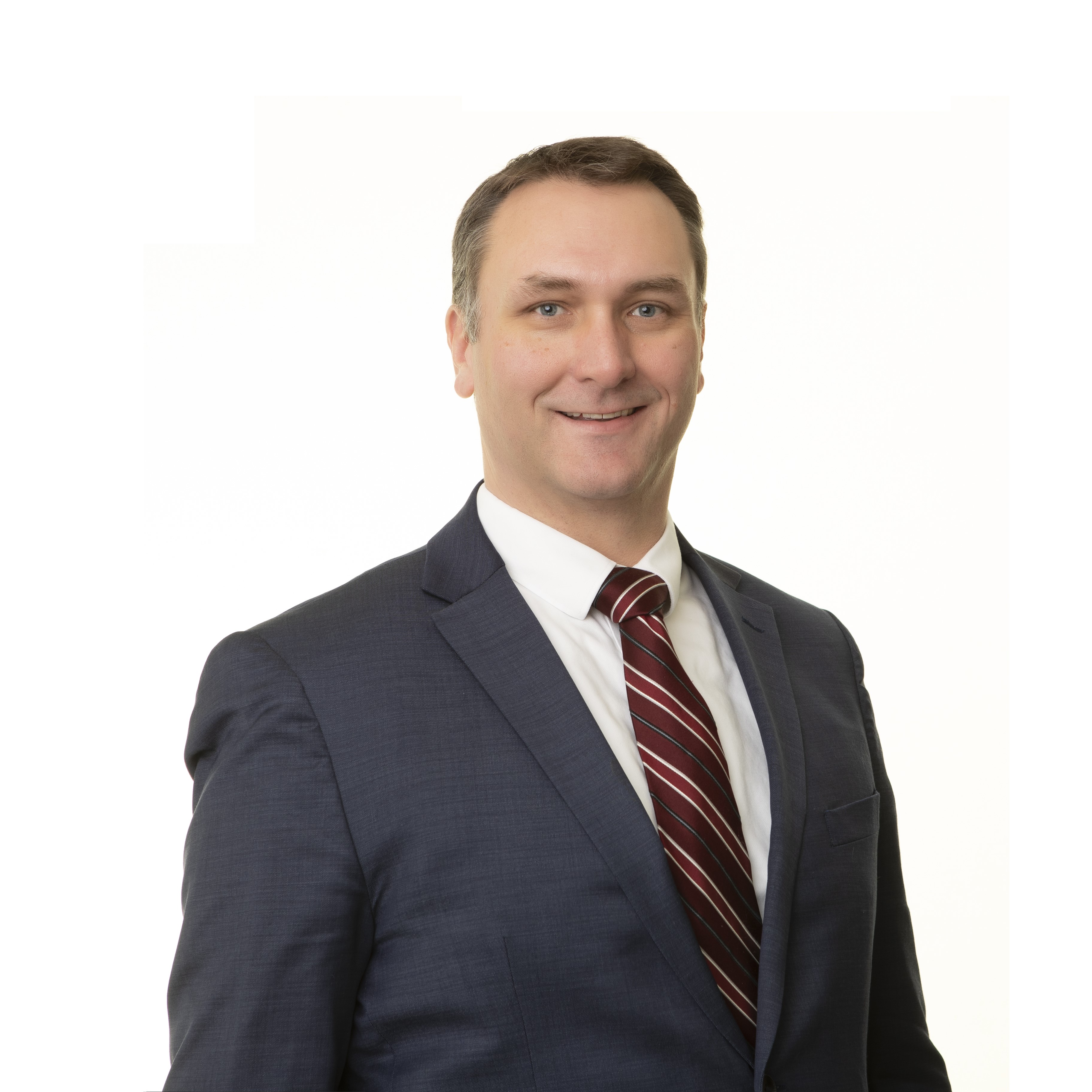
Dr. Markus Piro
Associate Professor
Department of Engineering Physics
Dr. Soohyun Byun
Professor
Department of Physics & Astronomy
Radiation Sciences Graduate Program
Dr. Soohyun Byun is a professor in the department of physics and astronomy and McMaster’s radiation sciences graduate program. Dr. Byun’s research interests include radiation detection, radiation dosimetry and industrial applications of radiation science and technology. His research program centres around developing advanced radiation detectors and digital signal processing systems to overcome the fundamental limitations of current detection technology.

Dr. Soohyun Byun
Professor
Department of Physics & Astronomy
Radiation Sciences Graduate Program
Dr. Hatem Zurob
Chair and Professor
Department of Materials Science & Engineering
Dr. Hatem Zurob is a professor and chair in the department of materials science and engineering. The aim of Dr. Zurob’s research is to understand and control microstructure development in engineering materials with the goal of optimizing mechanical properties. Dr. Zurob has made significant contributions to the areas of thermomechanical processing, recrystallization modelling, functionally graded materials, austenite decomposition and structure property relationships.
Dr. Zurob is recipient of several prestigious awards including Sawamura Award and Guimaraise Award of ISIJ and the Best Young Researcher Award of Internationally Recrystallization and Grain Growth Conference. In addition, Dr. Zurob is a dedicated educator who was recognized by several teaching awards at McMaster. Dr. Zurob is also an active participant in professional societies including ASM, TMS and ASM Materials Camps Canada.
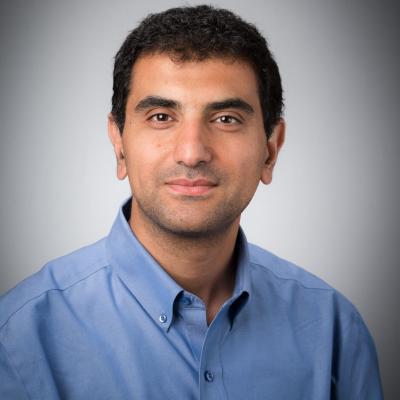
Dr. Hatem Zurob
Chair and Professor
Department of Materials Science & Engineering
Dr. Joey Kish
Director, Centre for Automotive Materials and Corrosion
Professor and Associate Chair of Graduate Studies
Department of Materials Science & Engineering
Dr. Joey Kish is a professor and associate chair of graduate studies in the Department of Materials Science and Engineering. He is also the Director of the Centre for Automotive Materials and Corrosion (CAMC) and a faculty member in the Steel Research Centre (SRC) and Biointerfaces Institute (BI). Dr. Kish’s research involves the application of electrochemical techniques (conventional and scanning) in combination with site-specific surface analytic techniques to establish links between the corrosion performance of structure engineering alloys and their corresponding surface films and underlying microstructures to elucidate the controlling anodic and cathodic processes in play. The end game is to develop corrosion control schemes that target the controlling anodic and/or cathodic processes: the emphasis being placed on microstructure development and protective coating schemes.

Dr. Joey Kish
Director, Centre for Automotive Materials and Corrosion
Professor and Associate Chair of Graduate Studies
Department of Materials Science & Engineering
Dr. Nana Ofori-Opoku
Assistant Professor
Department of Materials Science & Engineering
Dr. Nana Ofori-Opoku is an assistant professor in the department of materials science and engineering. Dr. Ofori-Opoku’s research is focused on understanding and predicting microstructure evolution in materials process and its consequence on materials behaviour. To achieve this, Dr. Ofori-Opoku combines experimental observations with high-performance computing, mathematical modelling, and non-equilibrium thermodynamics. On-going work using these methods involves applications to solidification process in additive manufacturing, precipitation reactions, and microstructure behaviour in nuclear materials.

Dr. Nana Ofori-Opoku
Assistant Professor
Department of Materials Science & Engineering
Dr. Wael El-Dakhakhni
Director, INTERFACE Institute
Professor
Department of Civil Engineering
School of Computational Science & Engineering
Dr. Wael El-Dakhakhni is a professor in the department of civil engineering and the school of computational science & engineering, and the director of the McMaster INTERFACE Institute – a multidisciplinary platform for researchers to collaboratively address grand challenges at the interfaces between social-, natural- and medical-sciences and engineering. Dr. El-Dakhakhni’s research is focused on creating functional digital twins of complex systems, including nuclear power stations, to identify their interdependence-induced vulnerabilities and subsequent risk to enhance their hyper resilience. Dr. El-Dakhakhni’s research also extends to experimentally evaluating the fragility of safety critical components (e.g., auxiliary power systems in nuclear stations) to identify systemic risks in complex multi-hazard environments.
Dr. El-Dakhakhni is the director of the NSERC CaNRisk-CREATE program – focused on training the next generation of experts to ensure the resilience of Canada’s nuclear infrastructure systems under natural (e.g., seismic) and anthropogenic (e.g., cyberattack) hazard threats.

Dr. Wael El-Dakhakhni
Director, INTERFACE Institute
Professor
Department of Civil Engineering
School of Computational Science & Engineering
Dr. Moncef Nehdi
Chair and Professor
Department of Civil Engineering
Dr. Moncef Nehdi is a professor and chair in the department of civil engineering. An award-winning scholar, educator, and industry manager, Dr. Nehdi is a global leader in cement and concrete research, recycling by-products in construction, and artificial intelligence applications in materials and structures. He is a prolific author with more than 450 research publications and listed in the world’s most cited civil engineers by Elsevier and the Shanghai Ranking, and in Stanford University’s World’s top 1% scientists. Dr. Nehdi’s research has been used in several landmark construction projects around the globe, beneficiated colossal mining and industrial by-products, and reduced the carbon footprint of various sectors of the economy. He served as Technical Manager for three different companies and is Canada’s lead professional development instructor for engineers on the durability and repair of concrete structures, design of formwork and temporary structures, and advanced concrete technology.
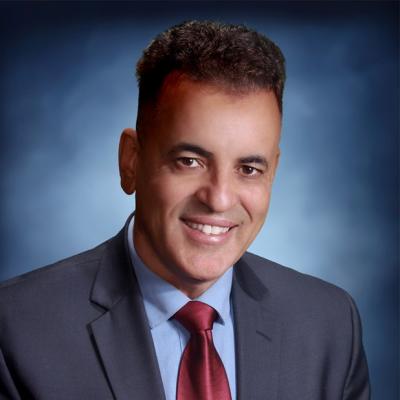
Dr. Moncef Nehdi
Chair and Professor
Department of Civil Engineering
Dr. Peijun Guo
Professor and Associate Chair of Graduate Studies
Department of Civil Engineering
Dr. Peijun Guo is a professor and associate chair of graduate studies in the department of civil engineering. Dr. Guo’s research focuses on geomechanics, geotechnical engineering and numerical modelling of complex geotechnical engineering problems. The key topics include: experimental characterization of geomaterials under various stress and environmental conditions, micromechanical analysis of granular materials, constitutive modelling of geomaterials by considering inherent and induced anisotropy, multiscale modelling of geo-mechanical problems involving multi-physics such as hydraulic fracturing, cold-region geotechnics, and impact of climate change on geotechnical structures. His research also covers seismic soil-structure interaction, highway and railway geotechnics, particularly the effect of low-amplitude cyclic loading on soil behaviour.
Dr. Guo is leading a research project funded by NSERC and the Canadian Nuclear Safety Commission focused on Managing multi-hazard risks hindering SMR deployment in the Canadian North.
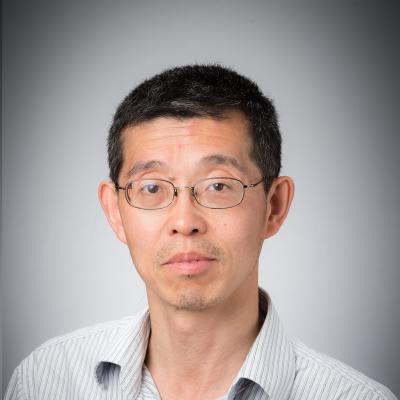
Dr. Peijun Guo
Professor and Associate Chair of Graduate Studies
Department of Civil Engineering
Dr. Ousmane Hisseine
Assistant Professor
Department of Civil Engineering
Dr. Ousmane Hisseine is an assistant professor in the department of civil engineering. Dr. Hisseine’s research group aims at fostering decarbonization pathways in the cement concrete sector to support local and global net-zero-carbon ambitions, thereby propelling the deployment of sustainable and resilient civil infrastructure.
Dr. Hisseine is leading a research project funded by NSERC and the Canadian Nuclear Safety Commission focused on Ultra-High-Performance Concrete Containments for Safer Small Modular Reactors.
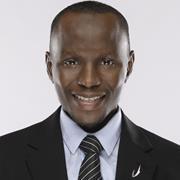
Dr. Ousmane Hisseine
Assistant Professor
Department of Civil Engineering
Dr. Drew Higgins
Assistant Professor
Department of Chemical Engineering
Dr. Drew Higgins is an assistant professor in the department of chemical engineering. Higgins’ research group focuses on the development of sustainable electro-chemical energy storage and conversion technologies and the materials that drive them. Some applications for this research include finding ways to use renewable energy to produce fuels, chemicals or charge batteries as portable or stationary energy storage.
Higgins completed his PhD in Chemical Engineering at the University of Waterloo in 2015. That year, he started a Banting Postdoctoral Fellowship at Stanford University, working on obtaining a fundamental understanding of the mechanisms and properties governing electrochemical CO2 reduction catalysis.
In 2017, he became an associate staff scientist at Stanford University and the SLAC National Accelerator Laboratory where he oversaw research activities focusing on discovering and understanding new electrocatalyst compositions and structures. He joined McMaster University in 2019.
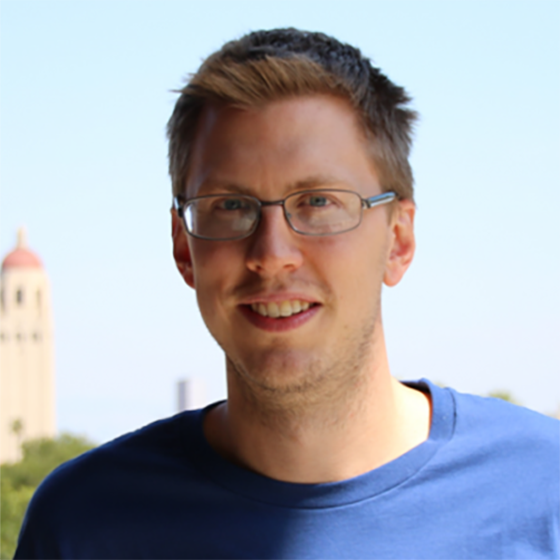
Dr. Drew Higgins
Assistant Professor
Department of Chemical Engineering
Dr. Prashant Mhaskar
Professor
Department of Chemical Engineering
Dr. Prashant Mhaskar is a professor in the department of chemical engineering. His research is focused on process systems engineering, with a focus on data-driven modelling and control, as well as fault detection and isolation. He is a member of the McMaster Advanced Control Consortium and has collaborated with numerous industrial partners in various applications, such as Johnson Controls, Praxair Inc (now Linde), Hydromantis, Dofasco, Sartorius Inc and Imperial Oil.

Dr. Prashant Mhaskar
Professor
Department of Chemical Engineering
Dr. Carmel Mothersill
Canada Research Chair in Radiobiology
Professor
Department of Biology
Dr. Carmel Mothersill is a professor in the department of biology and holds a Canada Research Chair in radiobiology. Dr. Mothersill and Dr. Colin Seymour run a radiobiology group of 10+ students focused on studying the effects of very low doses of radiation on human and non-human species. Dr. Mothersill and Dr. Seymour have a NSERC Alliance grant, with CANDU Owners Group (COG) as their industrial partner. The grant involves a collaboration with Dr. Soo Hyun Byun, who studies the accurate measurement of low radiation doses, while Dr. Mothersill and Dr. Seymour study the effects, particularly on fish and amphibians. Dr. Mothersill and Dr. Seymour are also interested in understanding the impacts of mining and the operational ends of CANDU reactors. They study the low-dose effects of tritium and of uranium decay chain isotopes on the environment.
Dr. Mothersill is leading a research project funded by NSERC and the Canadian Nuclear Safety Commission focused on the development of approaches to protection of the environment around SMRs.

Dr. Carmel Mothersill
Canada Research Chair in Radiobiology
Professor
Department of Biology
Dr. Colin Seymour
Professor
Department of Biology
Dr. Colin Seymour is a professor in the department of biology and an associate member of the department of earth, environment & science. Dr. Seymour’s research centers around the biological consequences of low-level radiation exposure. Dr. Seymour and Dr. Carmel Mothersill run a radiobiology group of 10+ students focused on studying the effects of low doses of radiation. Their lab uses tissue culture techniques to examine both the direct and indirect effects of radiation, and the transmission of these effects to neighbour and daughter cells. Dr. Seymour’s research has implications in both health and environmental fields, including in nuclear reactor waste management.

Dr. Colin Seymour
Professor
Department of Biology
Dr. Goran Calic
Associate Professor
Strategic Management, DeGroote School of Business
Dr. Goran Calic is an associate professor at McMaster University’s DeGroote School of Business. Dr. Calic studies the causes and outcomes of creativity and innovation. Dr. Calic conducts research on how crowds select innovations, whether some innovations are too creative, and how big data can be used to improve decision-quality and enhance innovation. Dr. Calic is currently using large datasets of news and media articles to study themes that pervade public debates about SMRs and examine how these debates affect public opinion.

Dr. Goran Calic
Associate Professor
Strategic Management, DeGroote School of Business
Dr. Marilyn Lightstone
Chair and Professor
Department of Mechanical Engineering
Dr. Marilyn Lightstone is a professor and chair in the department of mechanical engineering. She is a fellow of the Canadian Society for Mechanical Engineering. Before coming to McMaster, Dr. Lightstone was a nuclear thermalhydraulics analyst at Atomic Energy of Canada Limited. Dr. Lightstone’s research interests include computational fluid dynamics, heat transfer, and turbulent flows. Her nuclear research involves the modelling of inter-subchannel mixing for CANDU fuel bundles and the modelling of natural convection corium flows resulting from severe accidents. Her nuclear research is funded by the Natural Sciences and Engineering Research Council of Canada (NSERC) and the University Network of Excellence in Nuclear Engineering (UNENE).
Dr. Marilyn Lightstone
Chair and Professor
Department of Mechanical Engineering
Dr. Marilyn Lightstone is a professor and chair in the department of mechanical engineering. She is a fellow of the Canadian Society for Mechanical Engineering. Before coming to McMaster, Dr. Lightstone was a nuclear thermalhydraulics analyst at Atomic Energy of Canada Limited. Dr. Lightstone’s research interests include computational fluid dynamics, heat transfer, and turbulent flows. Her nuclear research involves the modelling of inter-subchannel mixing for CANDU fuel bundles and the modelling of natural convection corium flows resulting from severe accidents. Her nuclear research is funded by the Natural Sciences and Engineering Research Council of Canada (NSERC) and the University Network of Excellence in Nuclear Engineering (UNENE).
Dr. James S. Cotton
Co-Director, McMaster Institute for Energy Studies
Professor
Department of Mechanical Engineering
Dr. James Cotton is a professor in the department of mechanical engineering and co-director of the McMaster Institute for Energy Studies (MIES). Dr. Cotton’s research focuses on developing, modeling and experimentally validating energy systems and technologies to advance safe and efficient thermal management solutions, integrated energy systems, and nuclear energy harvesting technologies. Dr. Cotton’s research and industry experience involves nearly all aspects of the energy network, ranging from improving hybrid and electric vehicle performance, integrated community energy systems, and waste heat recovery from commercial and industrial processes to experimental and system modeling research on CANDU and micro-modular reactor (MMR) sub-systems and components.
Over the past six years, Dr. Cotton has liaised with a wide variety of communities and industrial partners to establish community energy plans, identify problems facing industry, and develop technology road maps to address these challenges and lead comprehensive research programs to provide sustainable energy solutions.
Dr. James S. Cotton
Co-Director, McMaster Institute for Energy Studies
Professor
Department of Mechanical Engineering
Dr. James Cotton is a professor in the department of mechanical engineering and co-director of the McMaster Institute for Energy Studies (MIES). Dr. Cotton’s research focuses on developing, modeling and experimentally validating energy systems and technologies to advance safe and efficient thermal management solutions, integrated energy systems, and nuclear energy harvesting technologies. Dr. Cotton’s research and industry experience involves nearly all aspects of the energy network, ranging from improving hybrid and electric vehicle performance, integrated community energy systems, and waste heat recovery from commercial and industrial processes to experimental and system modeling research on CANDU and micro-modular reactor (MMR) sub-systems and components.
Over the past six years, Dr. Cotton has liaised with a wide variety of communities and industrial partners to establish community energy plans, identify problems facing industry, and develop technology road maps to address these challenges and lead comprehensive research programs to provide sustainable energy solutions.
Dr. Stephen C. Veldhuis
Director, McMaster Manufacturing Research Institute
Professor
Department of Mechanical Engineering
Dr. Stephen Veldhuis is a professor in the department of mechanical engineering and director of the McMaster Manufacturing Research Institute (MMRI). Through his involvement in the MMRI, Dr. Veldhuis has worked with many researchers and industrial partners on leading-edge manufacturing technologies targeting a wide range of materials, complex geometries, and challenging finishes of direct importance to manufacturing SMRs. He is the Braley-Orlick Chair in Advanced Manufacturing Engineering.
His areas of interest in high-performance manufacturing include: continuous improvement through Lean initiatives, targeting tooling improvements and process development/optimization, and Industry 4.0 technologies, including process modeling, sensor integration, industrial Internet of Things (iIOT) and Artificial Intelligence (AI) / Machine Learning (ML), all of which are applied to realize higher levels of digitization on the shop floor to drive better decision-making.
Dr. Stephen C. Veldhuis
Director, McMaster Manufacturing Research Institute
Professor
Department of Mechanical Engineering
Dr. Stephen Veldhuis is a professor in the department of mechanical engineering and director of the McMaster Manufacturing Research Institute (MMRI). Through his involvement in the MMRI, Dr. Veldhuis has worked with many researchers and industrial partners on leading-edge manufacturing technologies targeting a wide range of materials, complex geometries, and challenging finishes of direct importance to manufacturing SMRs. He is the Braley-Orlick Chair in Advanced Manufacturing Engineering.
His areas of interest in high-performance manufacturing include: continuous improvement through Lean initiatives, targeting tooling improvements and process development/optimization, and Industry 4.0 technologies, including process modeling, sensor integration, industrial Internet of Things (iIOT) and Artificial Intelligence (AI) / Machine Learning (ML), all of which are applied to realize higher levels of digitization on the shop floor to drive better decision-making.
Dr. John Luxat
UNENE Industrial Research Chair
Professor
Department of Engineering Physics
Dr. John Luxat is a professor in the Department of Engineering Physics and holds a UNENE research chair in nuclear safety analysis. Dr. Luxat conducts experimental and theoretical modelling studies in nuclear safety thermalhydraulics. He performs severe accident modelling and analysis of nuclear power plants, including CANDU reactors. Dr. Luxat’s research in nuclear safety analysis methodology seeks to define, using an integrated probabilistic approach, the range of key plant parameters that assure safety limits are met at a prescribed level of probability and confidence. In particular, Dr. Luxat studies how changes in heat transfer regimes from nucleate boiling to film boiling influence both the operational safety margins and integrity of components of nuclear reactors during accidents.
Dr. John Luxat
UNENE Industrial Research Chair
Professor
Department of Engineering Physics
Dr. John Luxat is a professor in the Department of Engineering Physics and holds a UNENE research chair in nuclear safety analysis. Dr. Luxat conducts experimental and theoretical modelling studies in nuclear safety thermalhydraulics. He performs severe accident modelling and analysis of nuclear power plants, including CANDU reactors. Dr. Luxat’s research in nuclear safety analysis methodology seeks to define, using an integrated probabilistic approach, the range of key plant parameters that assure safety limits are met at a prescribed level of probability and confidence. In particular, Dr. Luxat studies how changes in heat transfer regimes from nucleate boiling to film boiling influence both the operational safety margins and integrity of components of nuclear reactors during accidents.
Dr. Dave Novog
Co-Director, McMaster Institute for Energy Studies
Professor
Department of Engineering Physics
Dr. Dave Novog is a professor in the department of engineering physics. He holds a UNENE industrial research chair in nuclear safety and several NSERC awards for nuclear research. His research focuses on nuclear safety, emergency planning and advanced inspection technologies. Dr. Novog is an appointed member of the OECD’s Generation IV Risk and Safety Working Group. He is also the co-director of the McMaster Institute for Energy Studies (MIES), which is involved in a broad range of energy initiatives, including research on coupling SMRs with community infrastructure to maximize the benefits of SMRs for host regions. He is currently leading the multi-university Small Modular Advanced Reactor Training (SMART) program which aims to provide graduates with skills in management, technology development, and government policy, in addition to the technical fundamentals of various SMR designs.
Dr. Dave Novog
Co-Director, McMaster Institute for Energy Studies
Professor
Department of Engineering Physics
Dr. Dave Novog is a professor in the department of engineering physics. He holds a UNENE industrial research chair in nuclear safety and several NSERC awards for nuclear research. His research focuses on nuclear safety, emergency planning and advanced inspection technologies. Dr. Novog is an appointed member of the OECD’s Generation IV Risk and Safety Working Group. He is also the co-director of the McMaster Institute for Energy Studies (MIES), which is involved in a broad range of energy initiatives, including research on coupling SMRs with community infrastructure to maximize the benefits of SMRs for host regions. He is currently leading the multi-university Small Modular Advanced Reactor Training (SMART) program which aims to provide graduates with skills in management, technology development, and government policy, in addition to the technical fundamentals of various SMR designs.
Dr. Shinya Nagasaki
Professor
Department of Engineering Physics
Dr. Shinya Nagasaki is a professor in the department of engineering physics. Dr. Nagasaki has studied the safety, waste disposal, and fuel cycles of a variety of nuclear reactors, like CANDU, LWR, and SCWR. Dr. Nagasaki is currently studying the optimized deployment of SMRs in Ontario on-grid systems and off-grid systems. Dr. Nagasaki is particularly interested in the radioactive waste management of SMRs. Through experimentation and theoretical simulation, Dr. Nagasaki is studying the sorption and diffusion of key elements, such as U, Pu, Tc, and Np. Dr. Nagasaki’s work is needed for identifying, analyzing, and managing the risks and uncertainties that must be considered in SMR deployment, from inventories and compositions of radionuclides to economic, political, societal, and environmental impacts.
Dr. Nagasaki will also be leading a training course on SMR waste management and fuel cycles as part of the SMART program.
Dr. Shinya Nagasaki
Professor
Department of Engineering Physics
Dr. Shinya Nagasaki is a professor in the department of engineering physics. Dr. Nagasaki has studied the safety, waste disposal, and fuel cycles of a variety of nuclear reactors, like CANDU, LWR, and SCWR. Dr. Nagasaki is currently studying the optimized deployment of SMRs in Ontario on-grid systems and off-grid systems. Dr. Nagasaki is particularly interested in the radioactive waste management of SMRs. Through experimentation and theoretical simulation, Dr. Nagasaki is studying the sorption and diffusion of key elements, such as U, Pu, Tc, and Np. Dr. Nagasaki’s work is needed for identifying, analyzing, and managing the risks and uncertainties that must be considered in SMR deployment, from inventories and compositions of radionuclides to economic, political, societal, and environmental impacts.
Dr. Nagasaki will also be leading a training course on SMR waste management and fuel cycles as part of the SMART program.
Dr. Adriaan Buijs
Professor and Associate Chair of Graduate Studies
Department of Engineering Physics
Dr. Adriaan Buijs is a professor and associate chair of graduate studies in the department of engineering physics. Dr. Buijs has over 20 years of experience in the nuclear industry (AECL and McMaster), including leading the physics design of the Advanced CANDU Reactor (ACR-1000). Dr. Buijs’ research is focused in reactor core physics and reactor design. Dr. Buijs is currently participating in the design of SMRs that use graphite as a moderator and different types of fuel and coolant. In particular, Dr. Buijs studies the neutronic behaviours of reactor cores and the possibility for creating a sub-critical test facility for SMRs at McMaster. Dr. Buijs also participates actively in McMaster’s SMART program.
Dr. Buijs is leading a research project funded by NSERC and the Canadian Nuclear Safety Commission focused on the Development of Tools for Analysis of Power Excursion Events of TRISO-Fuelled SMRs.
Dr. Adriaan Buijs
Professor and Associate Chair of Graduate Studies
Department of Engineering Physics
Dr. Adriaan Buijs is a professor and associate chair of graduate studies in the department of engineering physics. Dr. Buijs has over 20 years of experience in the nuclear industry (AECL and McMaster), including leading the physics design of the Advanced CANDU Reactor (ACR-1000). Dr. Buijs’ research is focused in reactor core physics and reactor design. Dr. Buijs is currently participating in the design of SMRs that use graphite as a moderator and different types of fuel and coolant. In particular, Dr. Buijs studies the neutronic behaviours of reactor cores and the possibility for creating a sub-critical test facility for SMRs at McMaster. Dr. Buijs also participates actively in McMaster’s SMART program.
Dr. Buijs is leading a research project funded by NSERC and the Canadian Nuclear Safety Commission focused on the Development of Tools for Analysis of Power Excursion Events of TRISO-Fuelled SMRs.
Dr. Christian Reiter
Adjunct Professor
Department of Engineering Physics
Dr. Christian Reiter is an adjunct professor in the department of engineering physics. He received a diploma in Physics from the Technical University of Munich (TUM) in 2014 and obtained his PhD in Physics from TUM in 2019. Dr. Reiter is currently the Head of Nuclear Science, Theory Division at TUM’s FRM II nuclear reactor. As part of McMaster and TUM’s Strategic Partnership, Dr. Reiter is collaborating with McMaster faculty to advance research and education in reactor core modelling and thermal hydraulics.
Dr. Christian Reiter
Adjunct Professor
Department of Engineering Physics
Dr. Christian Reiter is an adjunct professor in the department of engineering physics. He received a diploma in Physics from the Technical University of Munich (TUM) in 2014 and obtained his PhD in Physics from TUM in 2019. Dr. Reiter is currently the Head of Nuclear Science, Theory Division at TUM’s FRM II nuclear reactor. As part of McMaster and TUM’s Strategic Partnership, Dr. Reiter is collaborating with McMaster faculty to advance research and education in reactor core modelling and thermal hydraulics.
Dr. Markus Piro
Associate Professor
Department of Engineering Physics
Dr. Markus Piro is an associate professor in the Department of Engineering Physics. His research is focused on supporting the existing fleet of CANDU nuclear generating stations, performing fundamental research in support of emerging nuclear technologies (particularly SMRs), and research reactors. Dr. Piro held the Canada Research Chair in Nuclear Fuels and Materials at Ontario Tech University, where he led a multi-disciplinary team of students and post-docs working on academic and industrial projects in Canada and abroad.
Dr. Markus Piro
Associate Professor
Department of Engineering Physics
Dr. Markus Piro is an associate professor in the Department of Engineering Physics. His research is focused on supporting the existing fleet of CANDU nuclear generating stations, performing fundamental research in support of emerging nuclear technologies (particularly SMRs), and research reactors. Dr. Piro held the Canada Research Chair in Nuclear Fuels and Materials at Ontario Tech University, where he led a multi-disciplinary team of students and post-docs working on academic and industrial projects in Canada and abroad.
Dr. Soohyun Byun
Professor
Department of Physics & Astronomy
Radiation Sciences Graduate Program
Dr. Soohyun Byun is a professor in the department of physics and astronomy and McMaster’s radiation sciences graduate program. Dr. Byun’s research interests include radiation detection, radiation dosimetry and industrial applications of radiation science and technology. His research program centres around developing advanced radiation detectors and digital signal processing systems to overcome the fundamental limitations of current detection technology.
Dr. Soohyun Byun
Professor
Department of Physics & Astronomy
Radiation Sciences Graduate Program
Dr. Soohyun Byun is a professor in the department of physics and astronomy and McMaster’s radiation sciences graduate program. Dr. Byun’s research interests include radiation detection, radiation dosimetry and industrial applications of radiation science and technology. His research program centres around developing advanced radiation detectors and digital signal processing systems to overcome the fundamental limitations of current detection technology.
Dr. Hatem Zurob
Chair and Professor
Department of Materials Science & Engineering
Dr. Hatem Zurob is a professor and chair in the department of materials science and engineering. The aim of Dr. Zurob’s research is to understand and control microstructure development in engineering materials with the goal of optimizing mechanical properties. Dr. Zurob has made significant contributions to the areas of thermomechanical processing, recrystallization modelling, functionally graded materials, austenite decomposition and structure property relationships.
Dr. Zurob is recipient of several prestigious awards including Sawamura Award and Guimaraise Award of ISIJ and the Best Young Researcher Award of Internationally Recrystallization and Grain Growth Conference. In addition, Dr. Zurob is a dedicated educator who was recognized by several teaching awards at McMaster. Dr. Zurob is also an active participant in professional societies including ASM, TMS and ASM Materials Camps Canada.
Dr. Hatem Zurob
Chair and Professor
Department of Materials Science & Engineering
Dr. Hatem Zurob is a professor and chair in the department of materials science and engineering. The aim of Dr. Zurob’s research is to understand and control microstructure development in engineering materials with the goal of optimizing mechanical properties. Dr. Zurob has made significant contributions to the areas of thermomechanical processing, recrystallization modelling, functionally graded materials, austenite decomposition and structure property relationships.
Dr. Zurob is recipient of several prestigious awards including Sawamura Award and Guimaraise Award of ISIJ and the Best Young Researcher Award of Internationally Recrystallization and Grain Growth Conference. In addition, Dr. Zurob is a dedicated educator who was recognized by several teaching awards at McMaster. Dr. Zurob is also an active participant in professional societies including ASM, TMS and ASM Materials Camps Canada.
Dr. Joey Kish
Director, Centre for Automotive Materials and Corrosion
Professor and Associate Chair of Graduate Studies
Department of Materials Science & Engineering
Dr. Joey Kish is a professor and associate chair of graduate studies in the Department of Materials Science and Engineering. He is also the Director of the Centre for Automotive Materials and Corrosion (CAMC) and a faculty member in the Steel Research Centre (SRC) and Biointerfaces Institute (BI). Dr. Kish’s research involves the application of electrochemical techniques (conventional and scanning) in combination with site-specific surface analytic techniques to establish links between the corrosion performance of structure engineering alloys and their corresponding surface films and underlying microstructures to elucidate the controlling anodic and cathodic processes in play. The end game is to develop corrosion control schemes that target the controlling anodic and/or cathodic processes: the emphasis being placed on microstructure development and protective coating schemes.
Dr. Joey Kish
Director, Centre for Automotive Materials and Corrosion
Professor and Associate Chair of Graduate Studies
Department of Materials Science & Engineering
Dr. Joey Kish is a professor and associate chair of graduate studies in the Department of Materials Science and Engineering. He is also the Director of the Centre for Automotive Materials and Corrosion (CAMC) and a faculty member in the Steel Research Centre (SRC) and Biointerfaces Institute (BI). Dr. Kish’s research involves the application of electrochemical techniques (conventional and scanning) in combination with site-specific surface analytic techniques to establish links between the corrosion performance of structure engineering alloys and their corresponding surface films and underlying microstructures to elucidate the controlling anodic and cathodic processes in play. The end game is to develop corrosion control schemes that target the controlling anodic and/or cathodic processes: the emphasis being placed on microstructure development and protective coating schemes.
Dr. Nana Ofori-Opoku
Assistant Professor
Department of Materials Science & Engineering
Dr. Nana Ofori-Opoku is an assistant professor in the department of materials science and engineering. Dr. Ofori-Opoku’s research is focused on understanding and predicting microstructure evolution in materials process and its consequence on materials behaviour. To achieve this, Dr. Ofori-Opoku combines experimental observations with high-performance computing, mathematical modelling, and non-equilibrium thermodynamics. On-going work using these methods involves applications to solidification process in additive manufacturing, precipitation reactions, and microstructure behaviour in nuclear materials.
Dr. Nana Ofori-Opoku
Assistant Professor
Department of Materials Science & Engineering
Dr. Nana Ofori-Opoku is an assistant professor in the department of materials science and engineering. Dr. Ofori-Opoku’s research is focused on understanding and predicting microstructure evolution in materials process and its consequence on materials behaviour. To achieve this, Dr. Ofori-Opoku combines experimental observations with high-performance computing, mathematical modelling, and non-equilibrium thermodynamics. On-going work using these methods involves applications to solidification process in additive manufacturing, precipitation reactions, and microstructure behaviour in nuclear materials.
Dr. Wael El-Dakhakhni
Director, INTERFACE Institute
Professor
Department of Civil Engineering
School of Computational Science & Engineering
Dr. Wael El-Dakhakhni is a professor in the department of civil engineering and the school of computational science & engineering, and the director of the McMaster INTERFACE Institute – a multidisciplinary platform for researchers to collaboratively address grand challenges at the interfaces between social-, natural- and medical-sciences and engineering. Dr. El-Dakhakhni’s research is focused on creating functional digital twins of complex systems, including nuclear power stations, to identify their interdependence-induced vulnerabilities and subsequent risk to enhance their hyper resilience. Dr. El-Dakhakhni’s research also extends to experimentally evaluating the fragility of safety critical components (e.g., auxiliary power systems in nuclear stations) to identify systemic risks in complex multi-hazard environments.
Dr. El-Dakhakhni is the director of the NSERC CaNRisk-CREATE program – focused on training the next generation of experts to ensure the resilience of Canada’s nuclear infrastructure systems under natural (e.g., seismic) and anthropogenic (e.g., cyberattack) hazard threats.
Dr. Wael El-Dakhakhni
Director, INTERFACE Institute
Professor
Department of Civil Engineering
School of Computational Science & Engineering
Dr. Wael El-Dakhakhni is a professor in the department of civil engineering and the school of computational science & engineering, and the director of the McMaster INTERFACE Institute – a multidisciplinary platform for researchers to collaboratively address grand challenges at the interfaces between social-, natural- and medical-sciences and engineering. Dr. El-Dakhakhni’s research is focused on creating functional digital twins of complex systems, including nuclear power stations, to identify their interdependence-induced vulnerabilities and subsequent risk to enhance their hyper resilience. Dr. El-Dakhakhni’s research also extends to experimentally evaluating the fragility of safety critical components (e.g., auxiliary power systems in nuclear stations) to identify systemic risks in complex multi-hazard environments.
Dr. El-Dakhakhni is the director of the NSERC CaNRisk-CREATE program – focused on training the next generation of experts to ensure the resilience of Canada’s nuclear infrastructure systems under natural (e.g., seismic) and anthropogenic (e.g., cyberattack) hazard threats.
Dr. Moncef Nehdi
Chair and Professor
Department of Civil Engineering
Dr. Moncef Nehdi is a professor and chair in the department of civil engineering. An award-winning scholar, educator, and industry manager, Dr. Nehdi is a global leader in cement and concrete research, recycling by-products in construction, and artificial intelligence applications in materials and structures. He is a prolific author with more than 450 research publications and listed in the world’s most cited civil engineers by Elsevier and the Shanghai Ranking, and in Stanford University’s World’s top 1% scientists. Dr. Nehdi’s research has been used in several landmark construction projects around the globe, beneficiated colossal mining and industrial by-products, and reduced the carbon footprint of various sectors of the economy. He served as Technical Manager for three different companies and is Canada’s lead professional development instructor for engineers on the durability and repair of concrete structures, design of formwork and temporary structures, and advanced concrete technology.
Dr. Moncef Nehdi
Chair and Professor
Department of Civil Engineering
Dr. Moncef Nehdi is a professor and chair in the department of civil engineering. An award-winning scholar, educator, and industry manager, Dr. Nehdi is a global leader in cement and concrete research, recycling by-products in construction, and artificial intelligence applications in materials and structures. He is a prolific author with more than 450 research publications and listed in the world’s most cited civil engineers by Elsevier and the Shanghai Ranking, and in Stanford University’s World’s top 1% scientists. Dr. Nehdi’s research has been used in several landmark construction projects around the globe, beneficiated colossal mining and industrial by-products, and reduced the carbon footprint of various sectors of the economy. He served as Technical Manager for three different companies and is Canada’s lead professional development instructor for engineers on the durability and repair of concrete structures, design of formwork and temporary structures, and advanced concrete technology.
Dr. Peijun Guo
Professor and Associate Chair of Graduate Studies
Department of Civil Engineering
Dr. Peijun Guo is a professor and associate chair of graduate studies in the department of civil engineering. Dr. Guo’s research focuses on geomechanics, geotechnical engineering and numerical modelling of complex geotechnical engineering problems. The key topics include: experimental characterization of geomaterials under various stress and environmental conditions, micromechanical analysis of granular materials, constitutive modelling of geomaterials by considering inherent and induced anisotropy, multiscale modelling of geo-mechanical problems involving multi-physics such as hydraulic fracturing, cold-region geotechnics, and impact of climate change on geotechnical structures. His research also covers seismic soil-structure interaction, highway and railway geotechnics, particularly the effect of low-amplitude cyclic loading on soil behaviour.
Dr. Guo is leading a research project funded by NSERC and the Canadian Nuclear Safety Commission focused on Managing multi-hazard risks hindering SMR deployment in the Canadian North.
Dr. Peijun Guo
Professor and Associate Chair of Graduate Studies
Department of Civil Engineering
Dr. Peijun Guo is a professor and associate chair of graduate studies in the department of civil engineering. Dr. Guo’s research focuses on geomechanics, geotechnical engineering and numerical modelling of complex geotechnical engineering problems. The key topics include: experimental characterization of geomaterials under various stress and environmental conditions, micromechanical analysis of granular materials, constitutive modelling of geomaterials by considering inherent and induced anisotropy, multiscale modelling of geo-mechanical problems involving multi-physics such as hydraulic fracturing, cold-region geotechnics, and impact of climate change on geotechnical structures. His research also covers seismic soil-structure interaction, highway and railway geotechnics, particularly the effect of low-amplitude cyclic loading on soil behaviour.
Dr. Guo is leading a research project funded by NSERC and the Canadian Nuclear Safety Commission focused on Managing multi-hazard risks hindering SMR deployment in the Canadian North.
Dr. Ousmane Hisseine
Assistant Professor
Department of Civil Engineering
Dr. Ousmane Hisseine is an assistant professor in the department of civil engineering. Dr. Hisseine’s research group aims at fostering decarbonization pathways in the cement concrete sector to support local and global net-zero-carbon ambitions, thereby propelling the deployment of sustainable and resilient civil infrastructure.
Dr. Hisseine is leading a research project funded by NSERC and the Canadian Nuclear Safety Commission focused on Ultra-High-Performance Concrete Containments for Safer Small Modular Reactors.
Dr. Ousmane Hisseine
Assistant Professor
Department of Civil Engineering
Dr. Ousmane Hisseine is an assistant professor in the department of civil engineering. Dr. Hisseine’s research group aims at fostering decarbonization pathways in the cement concrete sector to support local and global net-zero-carbon ambitions, thereby propelling the deployment of sustainable and resilient civil infrastructure.
Dr. Hisseine is leading a research project funded by NSERC and the Canadian Nuclear Safety Commission focused on Ultra-High-Performance Concrete Containments for Safer Small Modular Reactors.
Dr. Drew Higgins
Assistant Professor
Department of Chemical Engineering
Dr. Drew Higgins is an assistant professor in the department of chemical engineering. Higgins’ research group focuses on the development of sustainable electro-chemical energy storage and conversion technologies and the materials that drive them. Some applications for this research include finding ways to use renewable energy to produce fuels, chemicals or charge batteries as portable or stationary energy storage.
Higgins completed his PhD in Chemical Engineering at the University of Waterloo in 2015. That year, he started a Banting Postdoctoral Fellowship at Stanford University, working on obtaining a fundamental understanding of the mechanisms and properties governing electrochemical CO2 reduction catalysis.
In 2017, he became an associate staff scientist at Stanford University and the SLAC National Accelerator Laboratory where he oversaw research activities focusing on discovering and understanding new electrocatalyst compositions and structures. He joined McMaster University in 2019.
Dr. Drew Higgins
Assistant Professor
Department of Chemical Engineering
Dr. Drew Higgins is an assistant professor in the department of chemical engineering. Higgins’ research group focuses on the development of sustainable electro-chemical energy storage and conversion technologies and the materials that drive them. Some applications for this research include finding ways to use renewable energy to produce fuels, chemicals or charge batteries as portable or stationary energy storage.
Higgins completed his PhD in Chemical Engineering at the University of Waterloo in 2015. That year, he started a Banting Postdoctoral Fellowship at Stanford University, working on obtaining a fundamental understanding of the mechanisms and properties governing electrochemical CO2 reduction catalysis.
In 2017, he became an associate staff scientist at Stanford University and the SLAC National Accelerator Laboratory where he oversaw research activities focusing on discovering and understanding new electrocatalyst compositions and structures. He joined McMaster University in 2019.
Dr. Prashant Mhaskar
Professor
Department of Chemical Engineering
Dr. Prashant Mhaskar is a professor in the department of chemical engineering. His research is focused on process systems engineering, with a focus on data-driven modelling and control, as well as fault detection and isolation. He is a member of the McMaster Advanced Control Consortium and has collaborated with numerous industrial partners in various applications, such as Johnson Controls, Praxair Inc (now Linde), Hydromantis, Dofasco, Sartorius Inc and Imperial Oil.
Dr. Prashant Mhaskar
Professor
Department of Chemical Engineering
Dr. Prashant Mhaskar is a professor in the department of chemical engineering. His research is focused on process systems engineering, with a focus on data-driven modelling and control, as well as fault detection and isolation. He is a member of the McMaster Advanced Control Consortium and has collaborated with numerous industrial partners in various applications, such as Johnson Controls, Praxair Inc (now Linde), Hydromantis, Dofasco, Sartorius Inc and Imperial Oil.
Dr. Carmel Mothersill
Canada Research Chair in Radiobiology
Professor
Department of Biology
Dr. Carmel Mothersill is a professor in the department of biology and holds a Canada Research Chair in radiobiology. Dr. Mothersill and Dr. Colin Seymour run a radiobiology group of 10+ students focused on studying the effects of very low doses of radiation on human and non-human species. Dr. Mothersill and Dr. Seymour have a NSERC Alliance grant, with CANDU Owners Group (COG) as their industrial partner. The grant involves a collaboration with Dr. Soo Hyun Byun, who studies the accurate measurement of low radiation doses, while Dr. Mothersill and Dr. Seymour study the effects, particularly on fish and amphibians. Dr. Mothersill and Dr. Seymour are also interested in understanding the impacts of mining and the operational ends of CANDU reactors. They study the low-dose effects of tritium and of uranium decay chain isotopes on the environment.
Dr. Mothersill is leading a research project funded by NSERC and the Canadian Nuclear Safety Commission focused on the development of approaches to protection of the environment around SMRs.
Dr. Carmel Mothersill
Canada Research Chair in Radiobiology
Professor
Department of Biology
Dr. Carmel Mothersill is a professor in the department of biology and holds a Canada Research Chair in radiobiology. Dr. Mothersill and Dr. Colin Seymour run a radiobiology group of 10+ students focused on studying the effects of very low doses of radiation on human and non-human species. Dr. Mothersill and Dr. Seymour have a NSERC Alliance grant, with CANDU Owners Group (COG) as their industrial partner. The grant involves a collaboration with Dr. Soo Hyun Byun, who studies the accurate measurement of low radiation doses, while Dr. Mothersill and Dr. Seymour study the effects, particularly on fish and amphibians. Dr. Mothersill and Dr. Seymour are also interested in understanding the impacts of mining and the operational ends of CANDU reactors. They study the low-dose effects of tritium and of uranium decay chain isotopes on the environment.
Dr. Mothersill is leading a research project funded by NSERC and the Canadian Nuclear Safety Commission focused on the development of approaches to protection of the environment around SMRs.
Dr. Colin Seymour
Professor
Department of Biology
Dr. Colin Seymour is a professor in the department of biology and an associate member of the department of earth, environment & science. Dr. Seymour’s research centers around the biological consequences of low-level radiation exposure. Dr. Seymour and Dr. Carmel Mothersill run a radiobiology group of 10+ students focused on studying the effects of low doses of radiation. Their lab uses tissue culture techniques to examine both the direct and indirect effects of radiation, and the transmission of these effects to neighbour and daughter cells. Dr. Seymour’s research has implications in both health and environmental fields, including in nuclear reactor waste management.
Dr. Colin Seymour
Professor
Department of Biology
Dr. Colin Seymour is a professor in the department of biology and an associate member of the department of earth, environment & science. Dr. Seymour’s research centers around the biological consequences of low-level radiation exposure. Dr. Seymour and Dr. Carmel Mothersill run a radiobiology group of 10+ students focused on studying the effects of low doses of radiation. Their lab uses tissue culture techniques to examine both the direct and indirect effects of radiation, and the transmission of these effects to neighbour and daughter cells. Dr. Seymour’s research has implications in both health and environmental fields, including in nuclear reactor waste management.
Dr. Goran Calic
Associate Professor
Strategic Management, DeGroote School of Business
Dr. Goran Calic is an associate professor at McMaster University’s DeGroote School of Business. Dr. Calic studies the causes and outcomes of creativity and innovation. Dr. Calic conducts research on how crowds select innovations, whether some innovations are too creative, and how big data can be used to improve decision-quality and enhance innovation. Dr. Calic is currently using large datasets of news and media articles to study themes that pervade public debates about SMRs and examine how these debates affect public opinion.
Dr. Goran Calic
Associate Professor
Strategic Management, DeGroote School of Business
Dr. Goran Calic is an associate professor at McMaster University’s DeGroote School of Business. Dr. Calic studies the causes and outcomes of creativity and innovation. Dr. Calic conducts research on how crowds select innovations, whether some innovations are too creative, and how big data can be used to improve decision-quality and enhance innovation. Dr. Calic is currently using large datasets of news and media articles to study themes that pervade public debates about SMRs and examine how these debates affect public opinion.
Related Centres & Institutes
What Are Small Modular Reactors?

What are SMRs and how will they benefit Canadians?
Small modular reactors (SMRs) are nuclear fission reactors. As their name suggests, SMRs are smaller than traditional nuclear power reactors. While conventional power reactors have a power capacity of 700+ megawatts of electricity, or MWe, SMRs typically have an electrical power output of 300 MWe or less. Small modular reactors can be used for a variety of purposes, including electrical power generation, radioisotope production, and materials research.
SMRs are ideal for installation in remote locations, where power needs are small. They can provide heat and power to homes, businesses, and natural resource industries. SMR components can be manufactured in factories and shipped to sites for assembly. This arrangement is much more cost and time-effective than custom-building a nuclear reactor for a particular location. It also means that SMRs can be added to large power grids as demands for electricity grow. Additionally, SMRs can be built based on standardized designs with inherent safety characteristics, and they may be installed underground, which increases security.
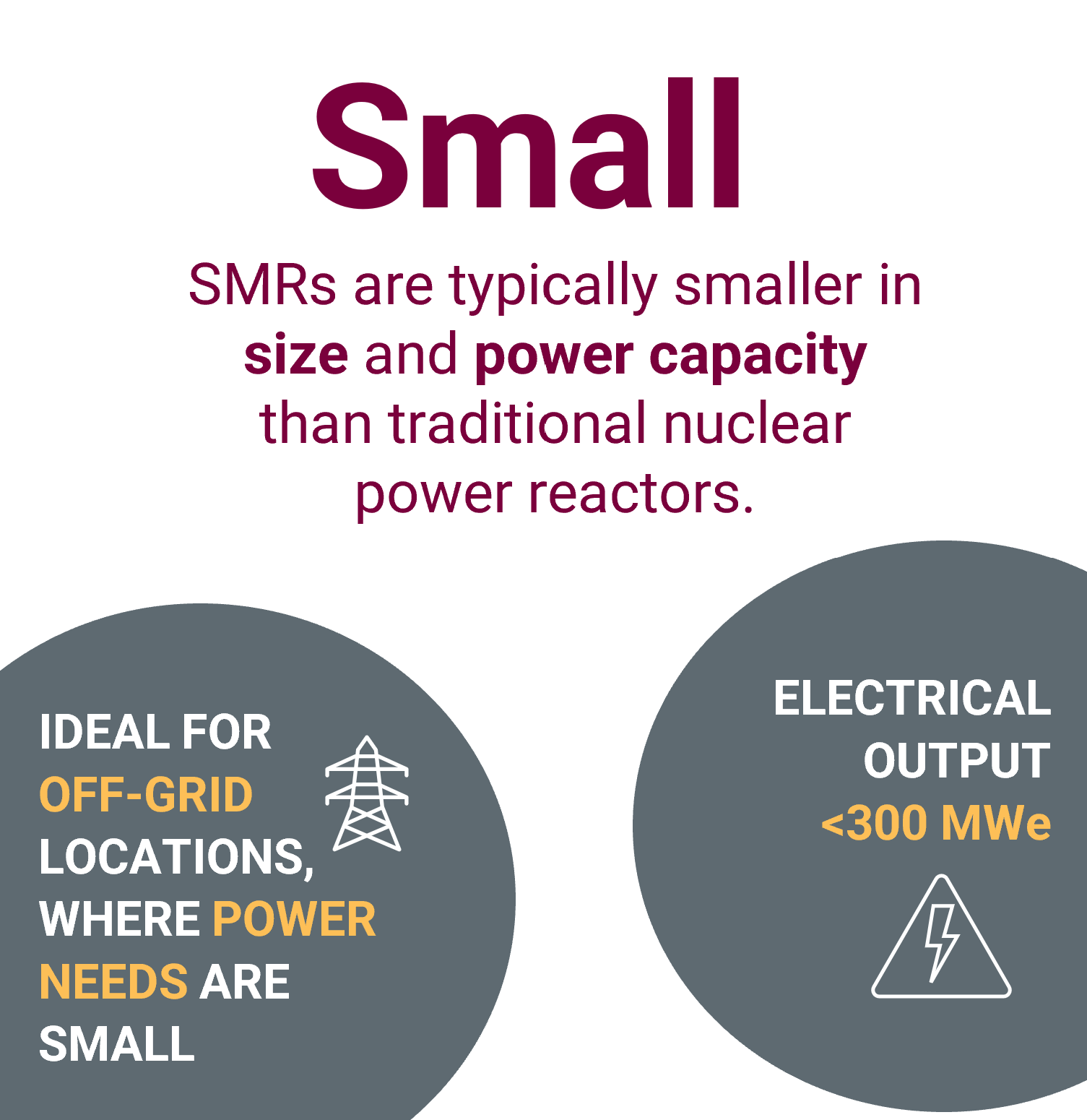

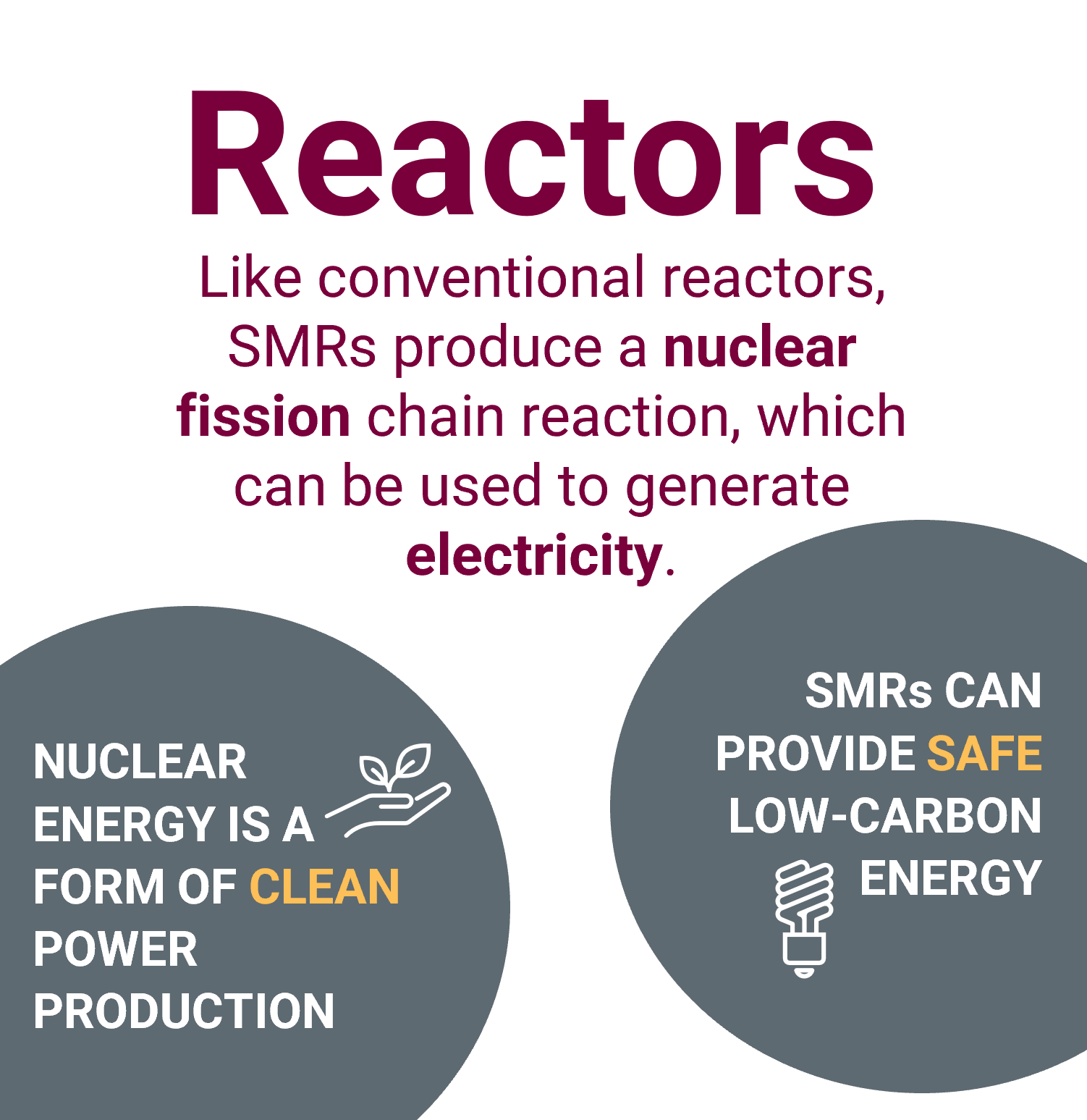
In addition to providing low-carbon electricity, SMRs have the potential to benefit Canadians in a myriad of ways, including facilitating the creation of a new industrial sub-sector, anchoring cutting-edge research in Canada, and placing Canada at the center of a global export market. Conservative estimates from Natural Resources Canada place the potential value for SMRs at $5.3B between 2025 and 2040. Globally, the SMR market is much bigger, with a conservative estimated value of $150B between 2025 and 2040.
The Canadian government announced its SMR Action Plan in 2020. The plan recognizes the potential economic, geopolitical, social, and environmental benefits of small modular reactor technology, and brings together key enablers across Canada who will lead the development, demonstration, and deployment of SMRs in Canada and abroad.
How will SMRs be regulated in Canada?
The Canadian Nuclear Safety Commission (CNSC) regulates the use of nuclear energy and materials in Canada to protect the health and safety of Canadians and the environment. As Canada’s nuclear regulator, the CNSC is prepared to regulate SMR facilities. All reactor facilities, including small modular reactors, are classified as Class IA nuclear facilities under the Class I Nuclear Facilities Regulation. This means the CNSC would apply the same criteria used in the regulation of traditional nuclear facilities to SMRs.
Learn more: Small modular reactors – Canadian Nuclear Safety Commission
What is McMaster’s role in Canada’s SMR Action Plan?
In December 2020, McMaster University announced it would be contributing a chapter to Canada’s SMR Action Plan, with a proposal to undertake a SMR Deployment Feasibility Study.
In consultation with community, business and government stakeholders, including Indigenous communities and municipal councils, the study will build on McMaster’s expertise in SMR technology validation, nuclear safety, waste reduction, nuclear security and site monitoring, and integrated urban energy systems. The study will also evaluate the possibility of McMaster hosting an SMR on- or off-campus.
Teams of researchers, including faculty and students from across all disciplines, will take a holistic approach to investigate the most appropriate SMR technology, addressing safety, security and environmental impacts of site selection; economic and technical aspects of selling excess electricity to the grid; social impacts and public acceptance of nuclear energy technologies.
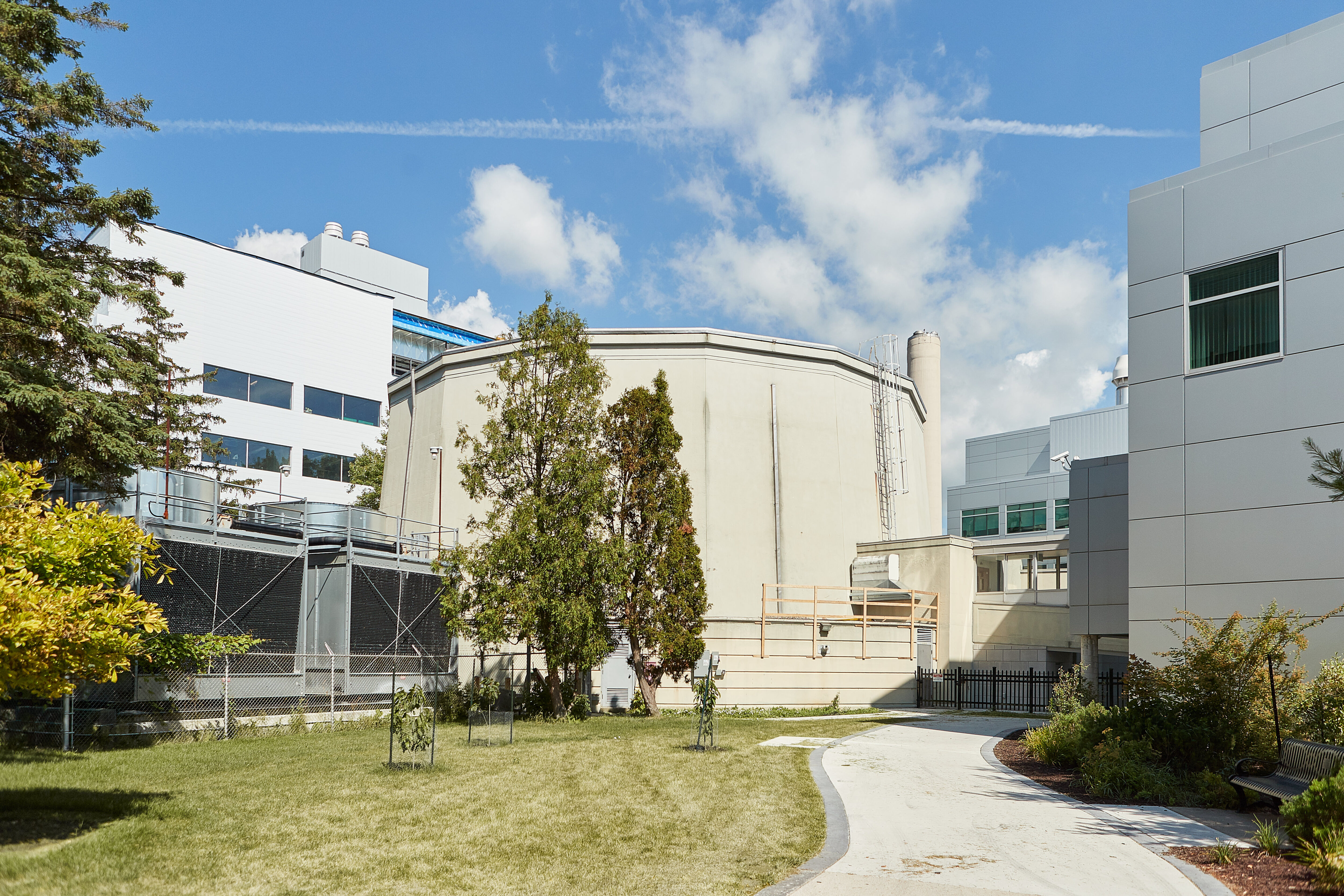
Is McMaster Nuclear Reactor (MNR) a Small Modular Reactor?
The McMaster Nuclear Reactor (MNR) is not a small modular reactor. MNR is not a ‘modular’ reactor, as it was custom-built on the University campus in 1959. With a maximum thermal power output of 5 MWe, MNR is commonly categorized as a microreactor.
While McMaster Nuclear Reactor is not technically an SMR, it is a nuclear fission reactor that has been a central part of the University campus for over 60 years. McMaster’s expertise in reactor operations and safety make the University well-equipped to conduct SMR research. As part of Canada’s SMR Action Plan, McMaster University is exploring the possibility of establishing an SMR on- or off-campus to enable further research into SMRs and potentially provide electricity to surrounding areas.
News
Information Box Group
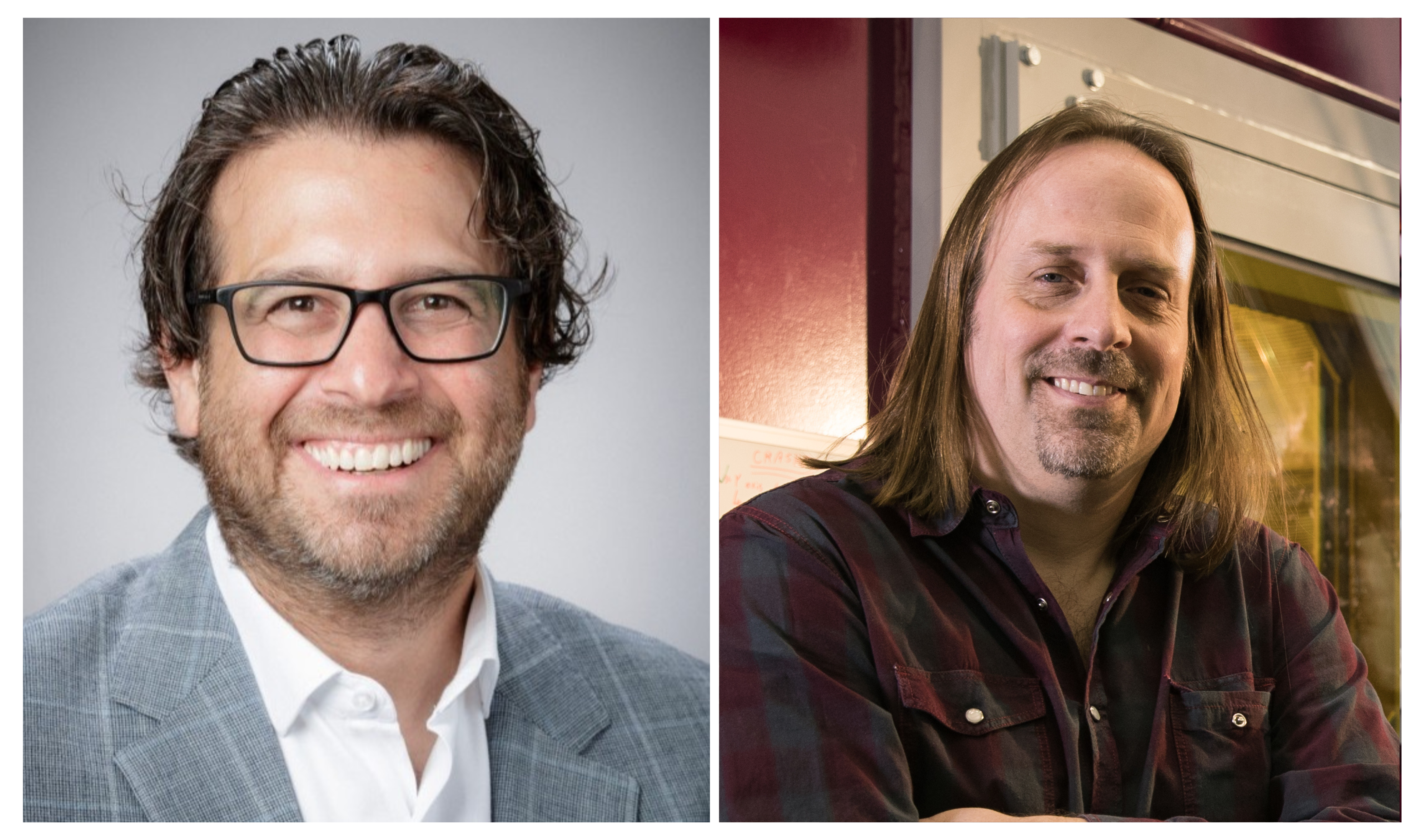
May 7, 2024

October 3, 2023
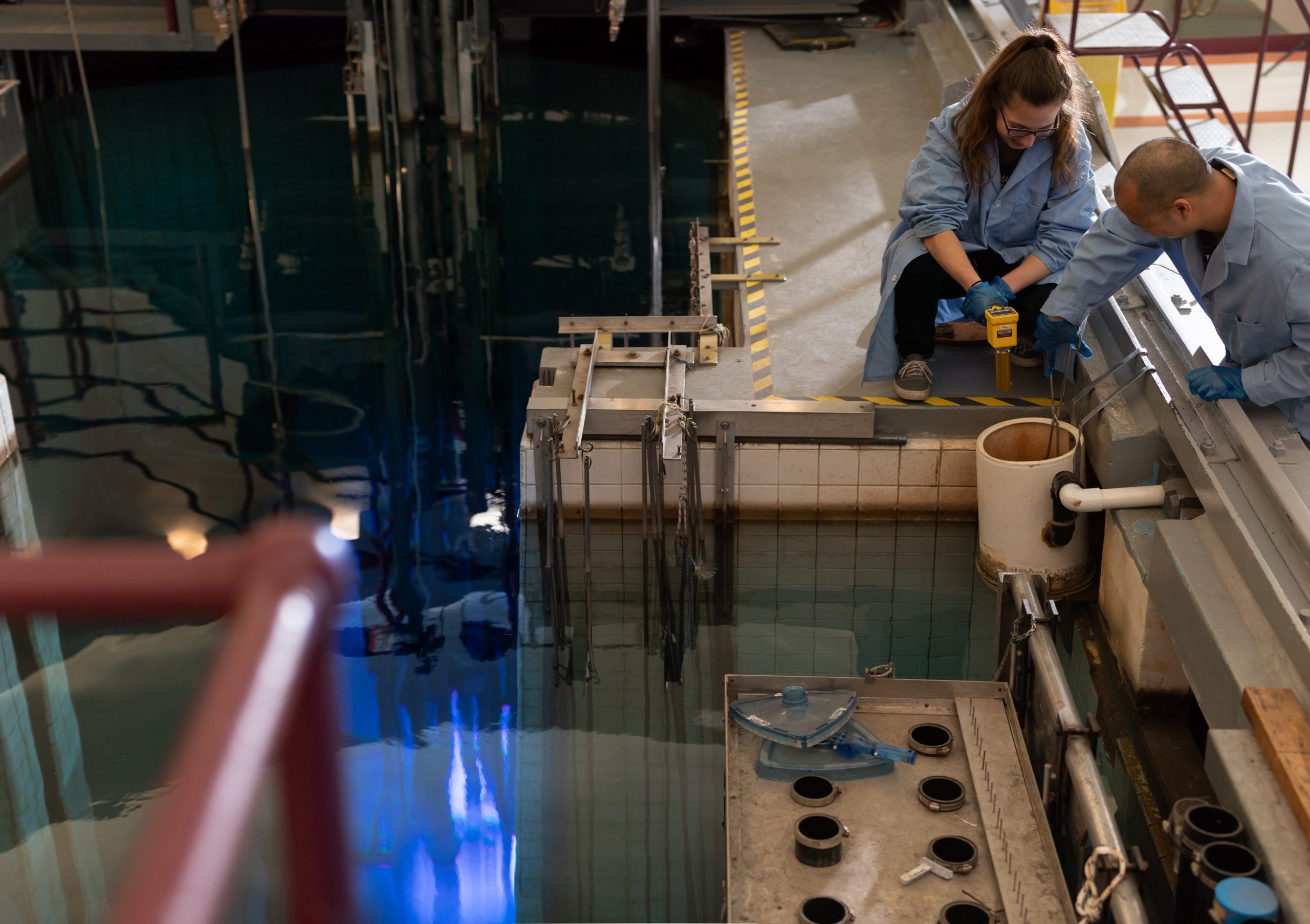
United Nations Academic Impact ➚
Advancing Nuclear Research: Countering Cancer and Climate Change
News
August 14, 2023
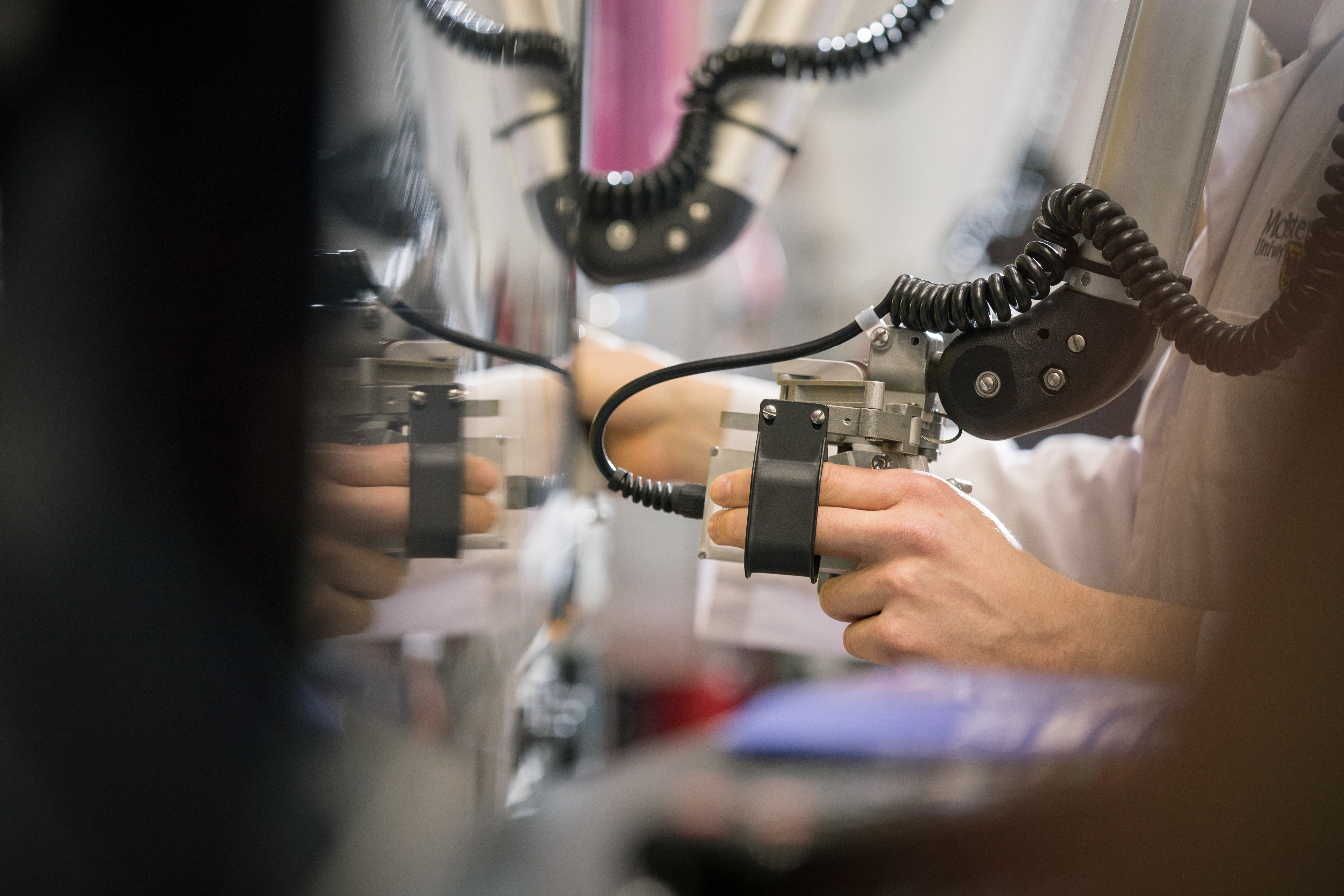
July 27, 2023
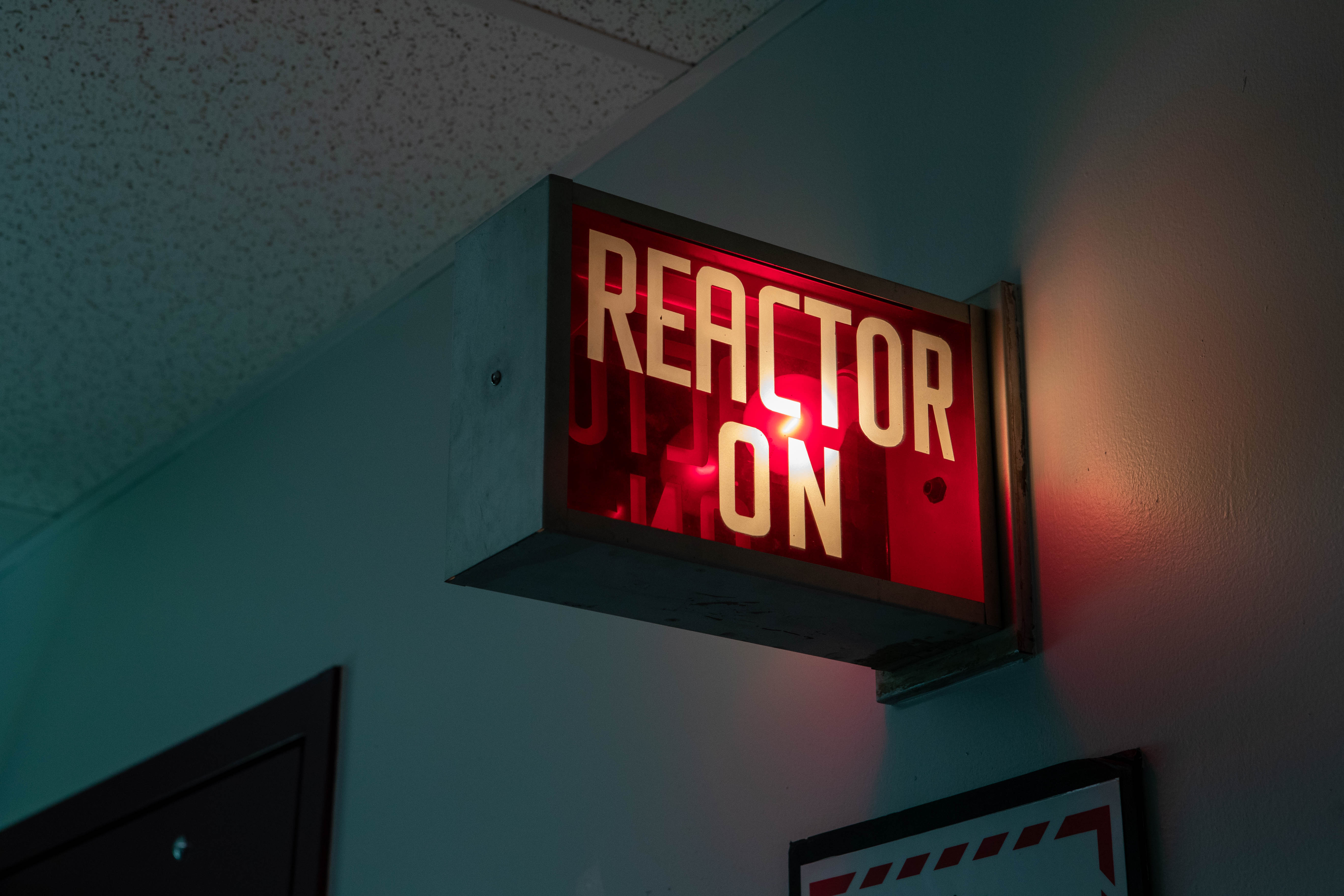
Research Infosource ➚
Powering a community of the future at Canada’s nuclear university
SMR Research & Development
March 3, 2023
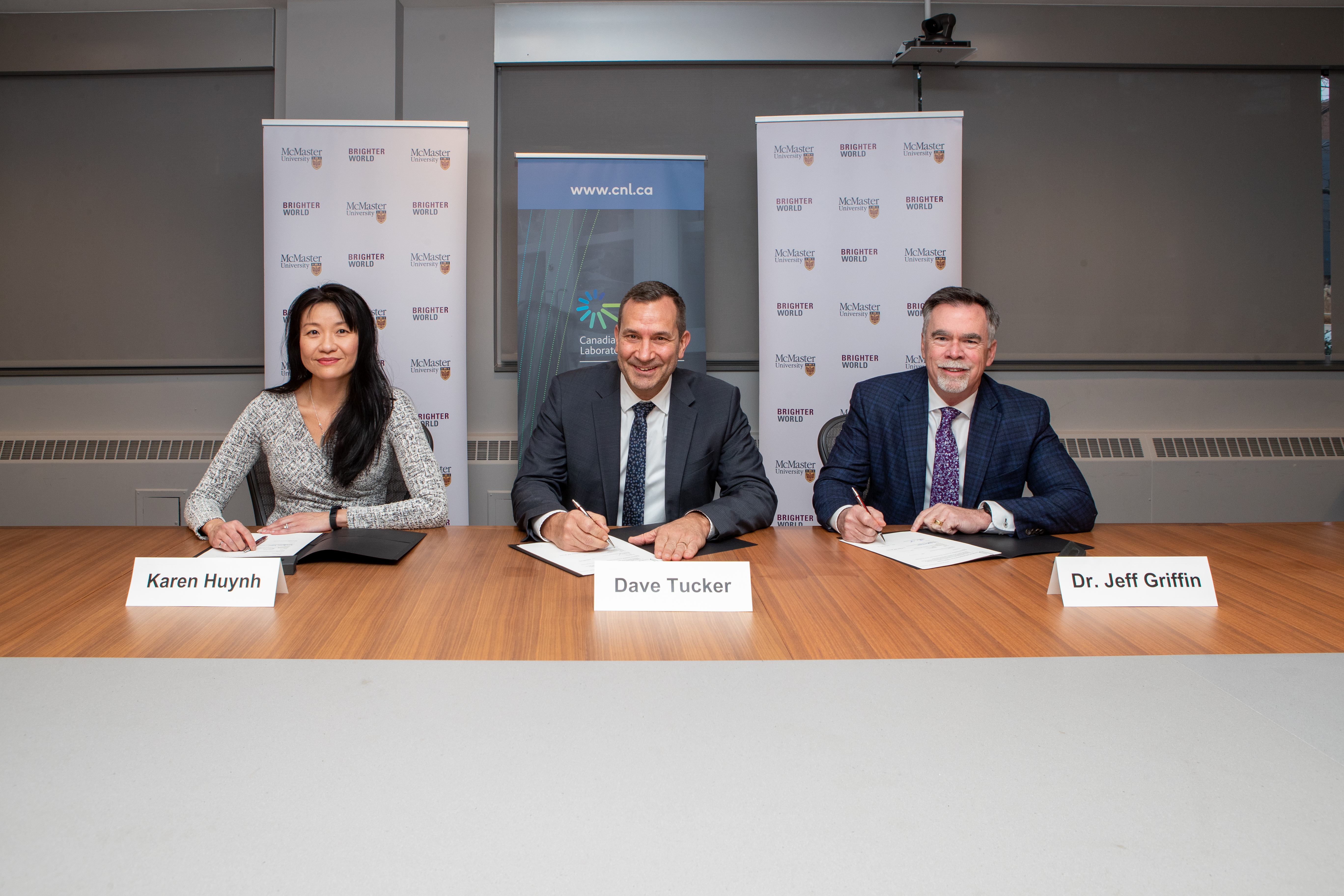
Brighter World ➚
McMaster partners with nuclear industry leaders to advance research and education
News
November 29, 2022
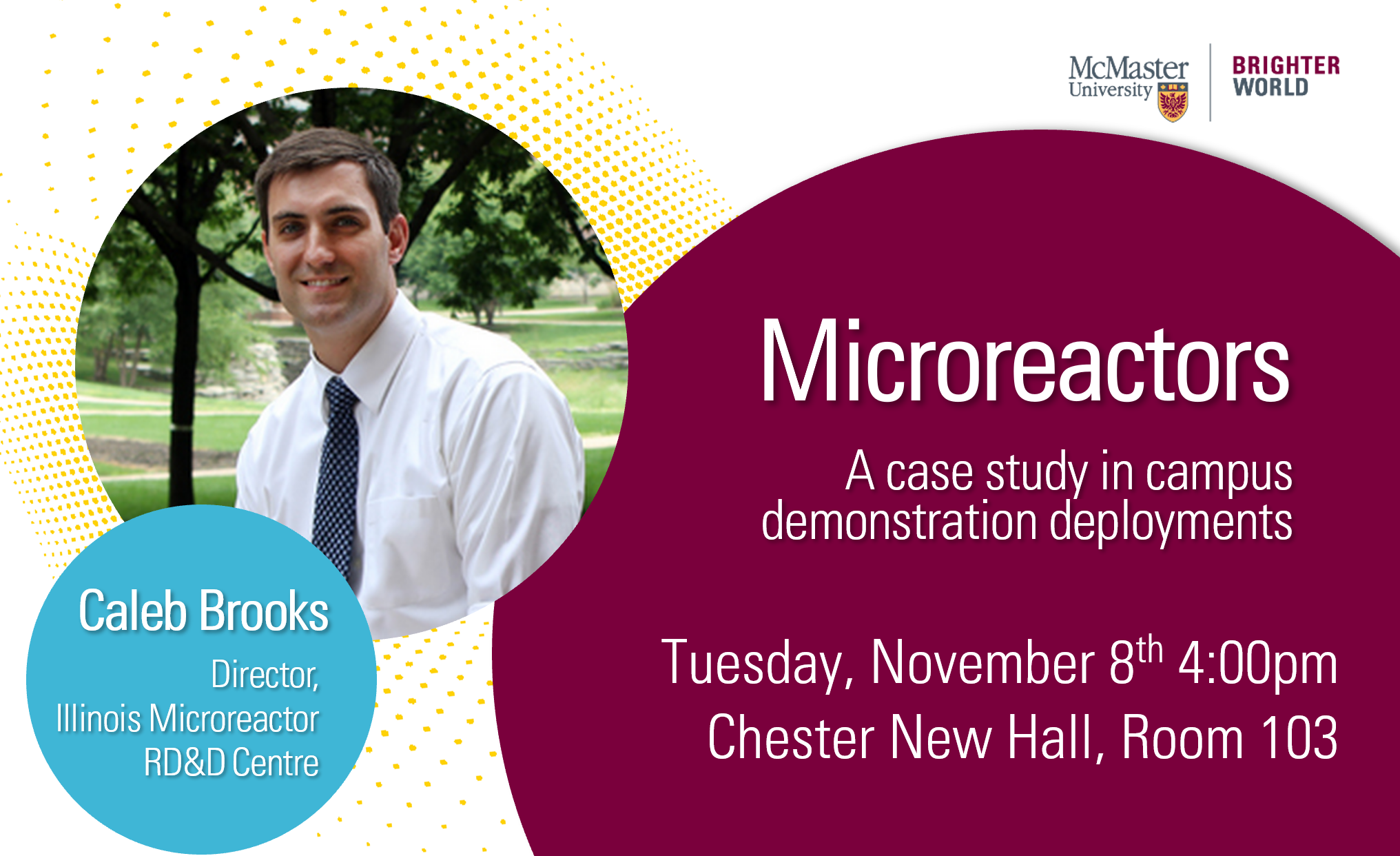
Microreactors: A case study in campus demonstration deployments
SMR Research & Development
October 20, 2022
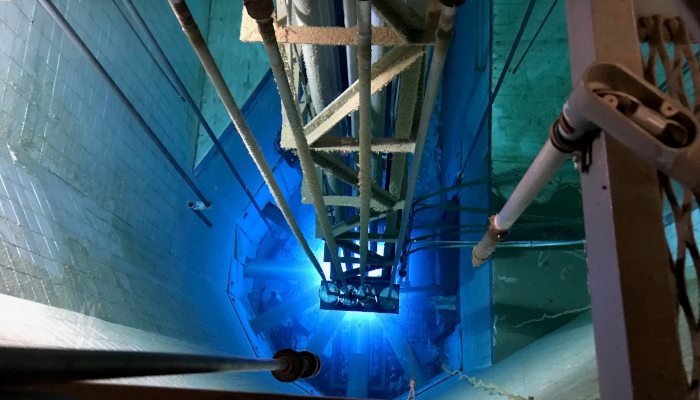
Brighter World ➚
McMaster experts speak at parliamentary committee on small modular reactors
SMR Research & Development
June 24, 2022
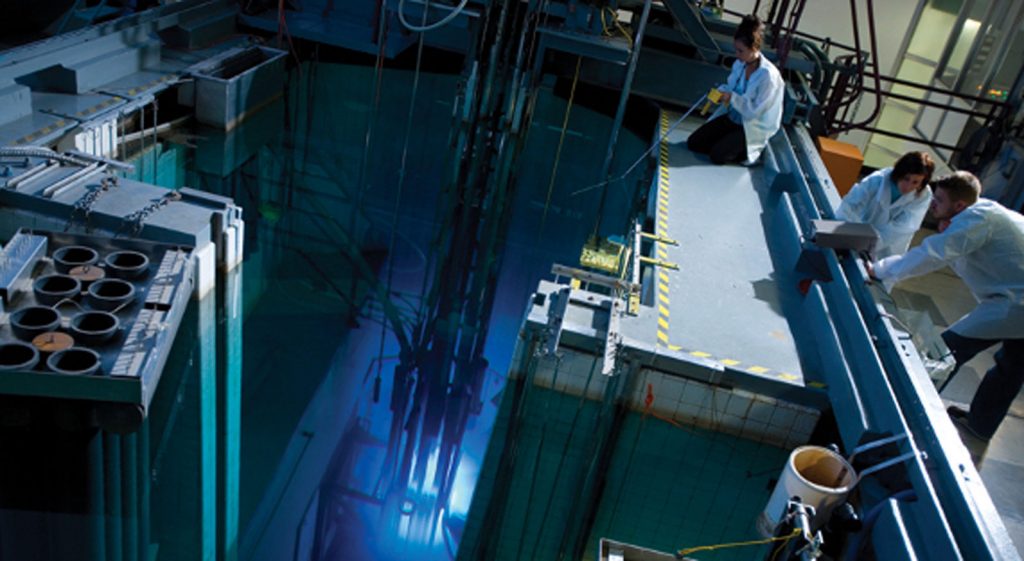
Brighter World ➚
McMaster, USNC, and GFP sign MOU to study deployment of Micro Modular Reactor (MMR®)
News
May 19, 2022
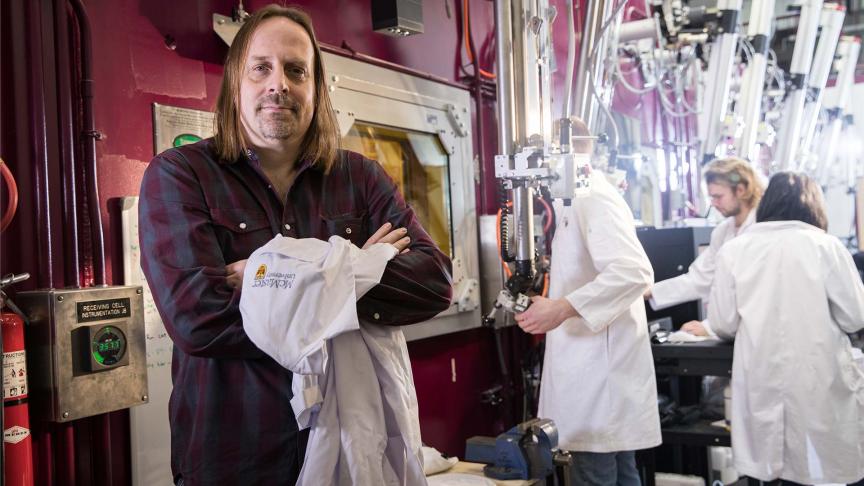
May 3, 2022
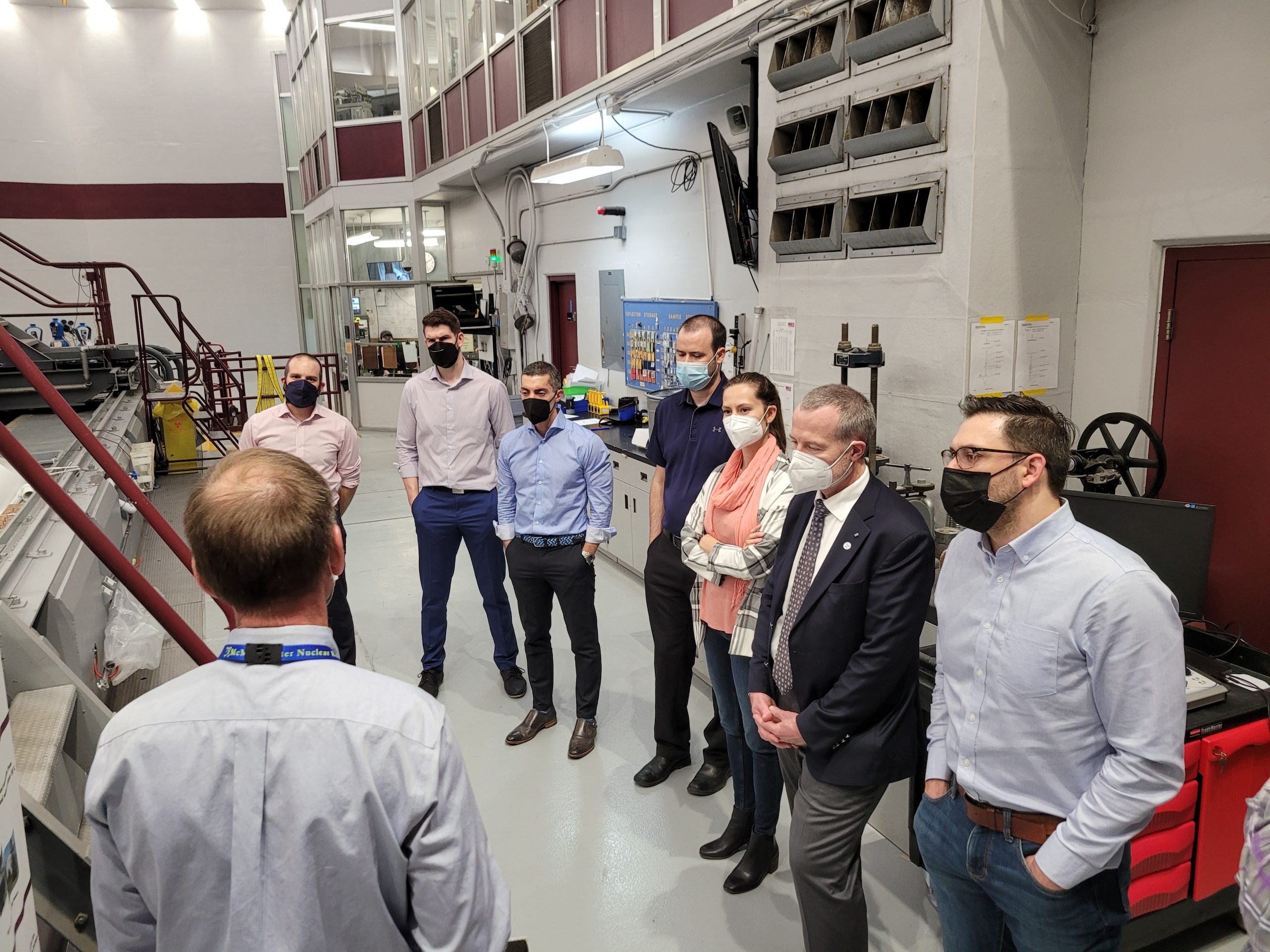
April 28, 2022
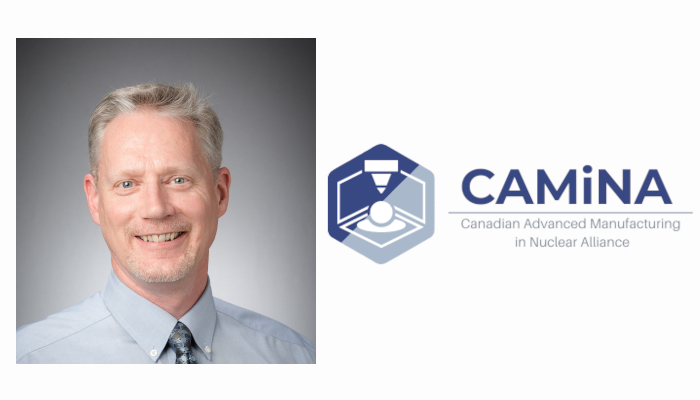
McMaster professor appointed Program Chair of Canadian Advanced Manufacturing in Nuclear Alliance (CAMiNA)
Materials, News, SMR Research & Development
March 16, 2022
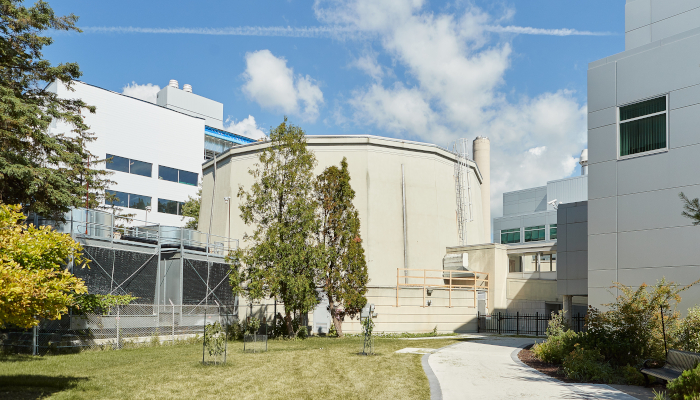
Brighter World ➚
McMaster plays ongoing role in federal government's new small modular reactors plan
SMR Research & Development
December 18, 2020

